#i have a whole framework for this you see this is act 2 bad end tadpoled isobel who got divine interventioned back in time to fix things
Text
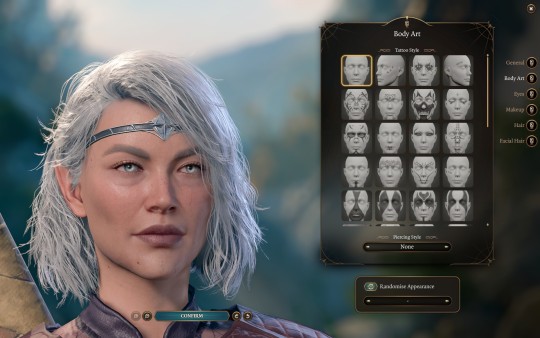
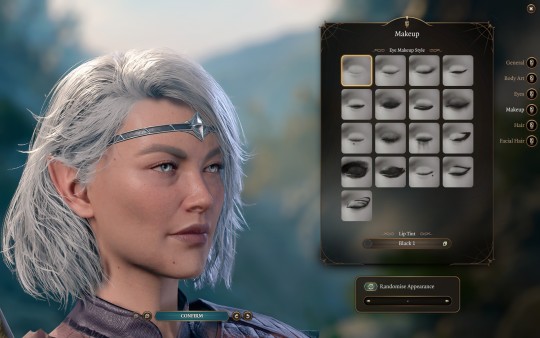
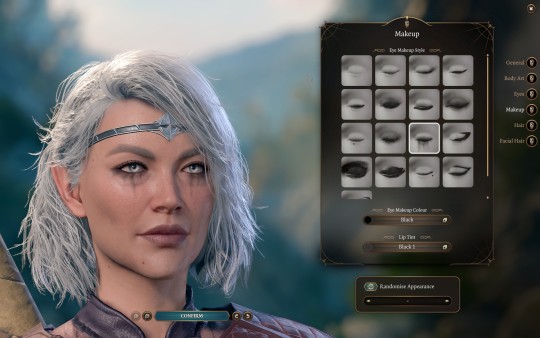
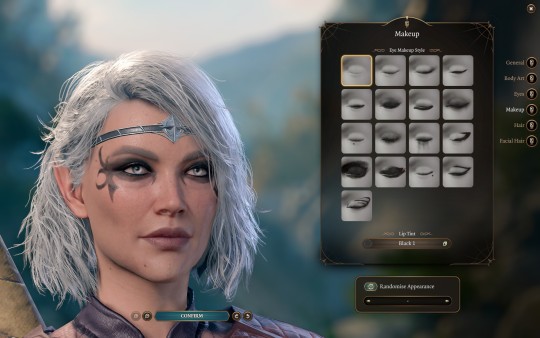
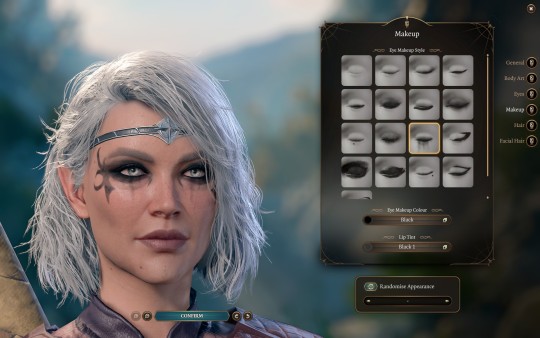
As I am currently using this mod to infuse my honour mode light domain cleric playthrough with some RP flavour, here's a makeup/tattoo breakdown of Isobel from the character creator because I've seen people be curious about it. Also because I Just Think She's Neat and I also find it absolutely wild of her to have her holy symbol tattooed around her eyes, including on her eyelids. Just Cleric Things(TM).
Anyway, I left her with the smudged runny messy makeup because, I don't know, feels iconic.
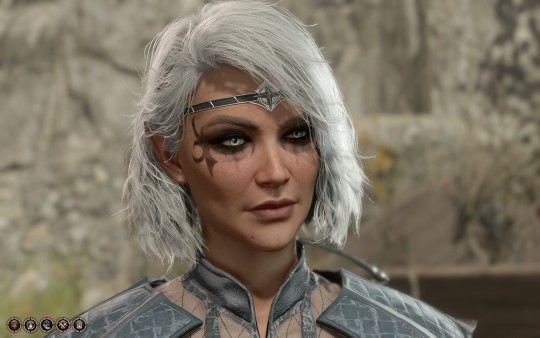
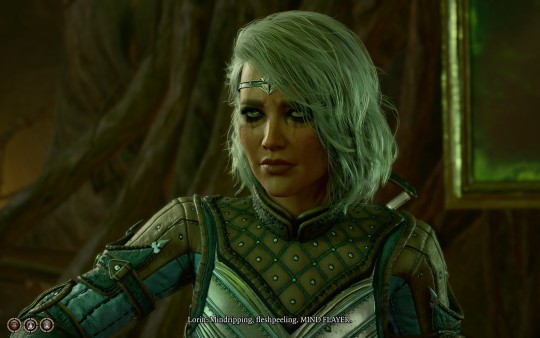
There are also some cool refs of her and her outfit here.
#isobel thorm#i will forever be in love with her 'hasn't slept in about a century' look#baldur's gate 3#bg3#mods#i have a whole framework for this you see this is act 2 bad end tadpoled isobel who got divine interventioned back in time to fix things#light domain isn't super fitting but you know what... twilight domain isn't in the game#life domain was my second option for the 'i'm a healer but...' vibes she has#but this is more fun which is what actually matters /obliterates your undead army HI DAD#the character artist mentioned the tidbit that those are tats and not just fancy face paint on that artstation post#i haven't been the same since
20 notes
·
View notes
Text
BLs with Strong Historical Elements
Costume dramas, historical BLs, and BLs with time travel or flashbacks to historical locations & times.
These are in order of my personal preference, best at the top.
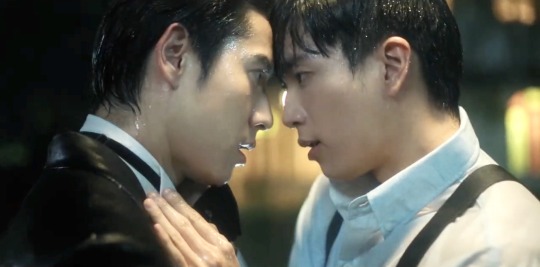
I Feel You Linger in the Air
2023 Thailand
IFYLITA is an exquisite BL, from filming techniques to narrative framework (much like Until We Meet Again). It's about a gay man from our time who falls into the past, becomes a servant to a noble house, and falls in love with the heir. It turns out this has all happened several times before. Steeped in history and family drama it edges into lakorn (but not as much as To Sir With Love and with way less scenery chewing). This is an elegant and classy soulmates BL... from Thailand which normally doesn't even try for classy. The main couple (both as a pair and as individuals) were excellent, particularly Bright (Yai) whose eye-work acting style is a personal favorite of mine. Pity about the ending. Oh it wasn’t that sad but it wasn’t good either. This show could easily have earned a 10/10 from me except that it fumbled the… erm… balls in the final quarter. Argh. Whatever.
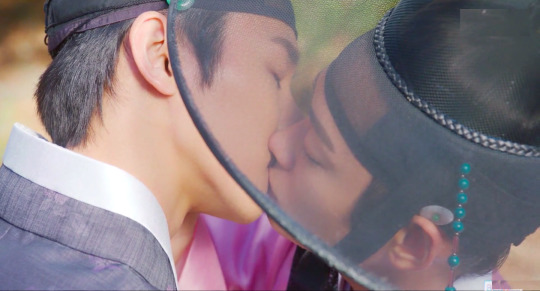
Nobleman Ryu's Wedding
2021 Korea - WeTV
A boy cross-dresses to take his runaway sister's place as a bride to a shy scholar, turns out they like being married. A historical setting allowed this BL to use some seriously old fashioned romance tropes (arranged marriage, evil step-sisters, Cinderfella) but also modern BL stylings like fake relationship & secret identity (drag) plus some cute gay panic. It reminded me of 12th Night more than anything else which just happens to be my favorite Shakespeare play. For all these reasons, I adored it.
(the ghat kiss!)

Tinted With You
2022 Korea - Viki
Fun stylish time travel meets portal fantasy with a likable cast, historical setting, and two actual kisses that mitigate the rough plot and issues around anachronisms.

Word of Honor
2021 China (censored) - Viki/YouTube?
I don’t rec Chinese stuff often, because I believe in censoring the censors, but this show is one of my favorites of the post 2016 censored bromances. It’s two murder-gay assassins (pining sunshine/tsundere), and they are so insanely gay for two boys who will never be allowed to kiss. Tropes include: wuxia, soulmates, paranormal, historical, and fantasy elements.
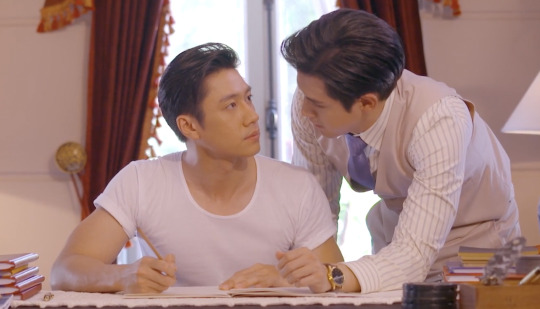
To Sir, With Love AKA Khun Chai
2022 Thailand - YouTube?
This is a true lakorn (basically Thai tellenovella or soap opera) with scenery chewing performances, especially from the mother characters. Gone With the Wind + Days of Our Lives but gay. That said? I loved it: A glorious central brother relationship (the best, made me cry), het romances, class divide + gay *gasp* main romance - oh my word, the campy drama of it all! Arranged marriage, rebellion, cut sleeves, over-the-top death with curses and regrets, beautiful if inaccurate costumes, secrets unraveling, cover ups, sparkle murder, sex herbs, coils within coils including snakes and murderous green metallic sequins (is anything gayer on this earth?). It’s a WILD ride but it does end happy for our gay boys. A man cries when he finds DEATH GLITTER. Come on! You haffa watch it. That said, like Manner of Death I struggle to rate something on a BL scale when it patently isn’t a BL. So I ended up giving this exactly what I gave that show, 7/10 I enjoyed it a whole lot, but not as a BL.
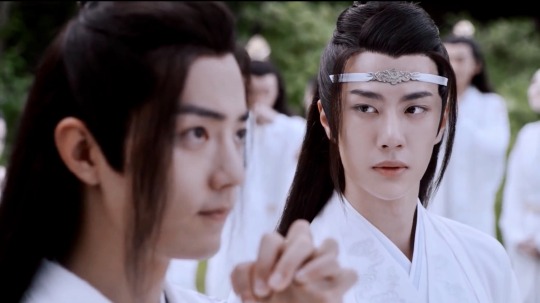
The Untamed (Special BL Edition)
2020 China (censored) - YouTube
Censored wuxia bromance, amorphous ending. Probubly the best known BL of its kind out of China and responsible for bring many fans to the BL side.

Our Skyy 2: Never Let Me Go
2023 Thailand - YouTube
I was nervous to watch this PondPhuwin vehicle but I liked it a lot! Doomed soulmates + paranormal time travel to fix the past. I’m happy for the outfits and the dancing (if not the singing). It’s not a bad premise and it’s nice to see GMMTV lean into its high production values for a change. I'd adore a full historical starring these two and this was definitely the best of the second series of Our Skyy. I don't think you have to have watched the original Never Let Me Go to enjoy this.
Legend of Long Yang: Rebirth
2017 China
Gaga
Whipping boy trope... literally, servant character takes the strap for the prince, who then makes him his bodyguard and lover when he becomes king. Low budget historical, comes off as kind of cosplay wuxia version of Irresistible Love, but we get (in the credits) an actual kiss, and they both live. So yay for small mercies.

The Director Who Buys Me Dinner
2023 Korea (historical flash backs)
iQIYI
A new employee at a film company encounters a director who claims to have lived 300 years and insists that they have to date (eat, hug & kiss) if baby doesn't want to die. It has a lot of Japanese elements, not the least of which are: an office setting, the fact that every character in this show is unhinged, and a killing of the gays. Featuring a gorgeous & stellar cast, TDWBMD should have utilized them less for melodrama and more for chemistry. This BL surprised me by going there with a lipstick mark AND an actually gay idol. But (you knew there was a but) while it's a unique twist on an office romance it is NOT a unique twist on the doomed red thread trope, resulting in it feeling less than the sum of its parts and ultimately unsatisfying. This might have also had to do with the fact that this was one of those KBLs where I felt how very short it was the whole time I was watching, like I was missing something constantly, in every episode. Worth watching for some but seriously flawed.

First Love Again
2022 Korea (historical flash backs) - Viki
A popular novelist who remembers his past lives meets his soulmate for the third time, only to find she has been reincarnated into the body of a man. This one started out a touch mean-spirited, but we eventually got a good kiss. The confession/rejection scene was justified and the reconciliation and ending was... fine. All in all, the pacing felt rushed and the romantic arc was underdeveloped. They go from like to love to boyfriends in a red hot minute. But that’s par for the course with Korea’s short form. If you don’t mind a heavy does of melodrama in your BL this one has a solid story with a strong concept that’s well acted and produced, making it a classic KBL with better than average chemistry but ultimately a touch forgettable.

Love in Spring AKA Spring of Crush
2022 Korea
This show was all over the place with uneven acting, narrative, and focus (sometimes it wanted to be a slapstick comedy, sometimes a depressing melodrama) which meant no one, actors or viewers, took anyone or anything seriously.... AND it’s a bromance. I was left wondering if SalHyung is now code for “they were roommates” in Kdrama historicals but otherwise largely apathetic and unimpressed. Korea, I now know you can do better. Do better.
Mermaid's Jade
2019 China (censored-esk) - Gaga
Kills the gay.
The Male Queen: Han Zi Gao
2016 China - Gaga
Kills the gay. Schrodinger's BL, both a BL and entirely not one at the same time.
Diary of Heong Yeong Dang
2014 Korea
Kills the Gay
I was gonna do a top 10 list, but there aren't enough by my metrics, so many end sadly.
This post at the behest of @verymuchof thank you for the idea!
Dated April 2023, includes only BLs that had finished their run by that date. Not responsible for cool costume flix that come after that. But you should check the comments to see if any have been added by others!
I might have missed a few that only have time historical elements since I don't always track those.
Also I would like to point out a decided lack of Japan on this list. My ninja yaoi consuming tiny past self is VERY upset about this void.
WHERE ARE MY GAY NINJAS??!!!
(source)
#historical bls#time travel bls#bls with historical elements#korean bl#chinese bl#thai bl#I Feel You Linger in the Air#Nobleman Ryu's Wedding#Scholar Ryu's Wedding#Tinted With You#Word of Honor#Khun Chai#to sir with love#The Untamed#Never let me go#Legend of Long Yang#The Director Who Buys Me Dinner#First Love Again#Love in Spring#Spring of Crush
183 notes
·
View notes
Text
Anders, the player, and betrayal
This actually Is (I think) an unpopular Anders opinion but I don't think his lying to you about the Chantry boom constitutes a betrayal any more than the Chantry boom itself. Ignoring the fact that I have literally seen people call any element of a romance they don't like a betrayal (ie long distance with Dorian, Morrigan's whole deal), I think people are keen to throw around the word in specific ways.
I'm going to define it like this: a betrayal means undertaking an action, either materially or verbally, that would cause harm to the person you're betraying (or the reverse, for a vital action that would prevent harm. For example, refusing to help Fenris get rid of Danarius would be a betrayal). By that definition, the Chantry boom is a betrayal if it would harm or result in harm to Hawke.
The Chantry boom does not physically target Hawke, or anyone other than those in the Chantry at the time - which is very few people. So it's not a direct betrayal. It does, however, threaten Hawke with harm to the extent that Hawke would inevitably be involved in the conflict that follows - if Hawke is a mage, it puts them in harm's way, and if Bethany is alive and in the Circle then it puts Hawke's family at risk. However, this is the action that Anders/Handers fans are most likely to say is not betrayal. I'll get into that later.
On the other hand, there's the lying to Hawke bit. Because Anders does intentionally deceive Hawke… but not to their detriment. It is Hawke's lack of knowledge of the Chantry boom that means they're not also immediately singled out for execution like Anders is after the boom. If Hawke sides with the Templars, it is their lack of knowledge that can allow them to become Viscount. When Anders lies to Hawke, it's not to their loss. It doesn't put them at risk. It is, by some definition, the opposite of betrayal, because the only way that knowing can benefit them is either preparing for it (and Hawke should be preparing for things to go tits up anyway, considering the events of Act 3) or preventing it from happening in the first place (impossible, in the framework of the game - because we always have to remember when considering DA characters that they're just that: characters, constrained by the fact that the game has a single end point. Even if you don't buy that, the point of this post is the distinction drawn between the boom and Anders lying about it, so if you want to have the option to stop him then this isn't directed at you lmao).
So here, we reach the point: the Chantry boom is, by a pretty reasonable reckoning, more of a betrayal of Hawke than lying about it is. The former endangers Hawke; the latter protects them. When Anders lied, he was acting in Hawke's best interests. The distinction I'm specifically drawing here is:
1 - if you do something bad to someone and never tell them, it's betrayal
2 - if you do something good to them and never tell them, it's not betrayal
3 - if you do something good and tell them, it's not betrayal
4 - if you do something bad and tell them, it's betrayal
If the Chantry boom is seen as a bad action towards Hawke, then it is always bad, no matter when Anders tells them. If the Chantry boom is not bad, then telling or not telling them makes no difference to whether it's bad or not. If you lie about a good thing, it's still a good thing!
At worst, Anders’ lies are an intentional deception for a Hawke who he doesn’t even like. They’re not a lack of trust, they’re an act of mercy. Anders looks at Hawke and doesn’t want them tarred with the same brush as him; he doesn’t have a way out, but maybe they do.
So: why do people say that Anders' lies are a betrayal? The reason I usually see is that he should have trusted them, but Anders has a canon answer to that very question: he did. The lies were for Hawke's benefit. He trusted them to do whatever they saw fit in response to the boom, but didn't want to see them lose out from a choice they wouldn't be able to sway him from. (Also, it's not like he's subtle about what he's doing. The rails the game puts the player on are not Anders' characterisation - if anything, they're Hawke's.)
The other thing I see people say is that Anders should have given them the choice to support or reject him before he did it. But it's not actually a choice that involves Hawke specifically. Why don't people frame Anders' decision as a betrayal of the other people in the party? Or of the entire city of Kirkwall? Plenty of writing surrounding the end of the game or after it is happy to do that, but that's also linked with seeing the boom as a bad thing. Again; they're not separable elements in that framework.
The one exception here is that I think it’s reasonable to say that your Hawke might feel betrayed by Anders’ actions when he lied to them. They’re in the thick of it, they have the ultimate perspective on how they would react to him telling the truth. But the player is not Hawke, and it’s the player who tends to talk about how Anders made them feel by lying.
This is potentially going to sound a little uncharitable, but at the end of the day, I think that the dislike of Anders’ choice not to speak to Hawke about his plans has very little to do with Hawke and everything to do with the player as an observer but also participator in the narrative. I’ve already gone into why I find it difficult to see Anders as having wronged Hawke — but he does, technically, wrong the player.
As the player, the game reveals (almost) all to us. When a character goes behind our backs, taking away our agency in a game that is, to a lot of people, meaningfully choice-based, it can feel like betrayal. Anders isn’t doing it for our benefit — he conceals his actions from a player only his writers know exists. Can you betray someone you don’t know exists by lying to them?
It isn’t Hawke who’s entitled to the knowledge of Anders’ plans; it’s the player who feels entitled to it. Anders exercises a power over the narrative that the player does not have, and the writers choose to have him do so without our input. The Chantry boom is his ultimate act of agency on more than one level, and players don’t like it.
Anyway that’s my salty rant that went off in multiple directions.
Funnily enough, I started writing this with the viewpoint that I was going to argue that Anders’ actions weren’t betrayal. Instead, I want to leave you with this: it can be a betrayal, but only if you acknowledge the Chantry boom as one as well. If you think it isn’t, then he didn’t wrong anyone except your own desire to know and have a hand in everything that your allies do. One of the best things about DAII is that your companions really do have lives and wishes of their own, and wanting to be with them every step of the way just isn’t the way it works.
#anders#dragon age 2#anders dragon age#wrote this a while and it was probably vagueposting about some bad take in a discord server but it's been a while now#so here. mage moralising
25 notes
·
View notes
Note
oh man i have a Lot of thoughts about the autopsy of jane doe, both positive and critical For Sure, i'd be SO excited to see your analysis of it! definitely keeping an eye out for that 👀
thanks! i'm working on something article-like to talk about the film and i don't know what i want to do with it yet lol but if i don't post it on here i'll definitely link it. it's mainly a discussion of gender in possession/occult films in the same way that carol clover describes in men, women, and chainsaws - that there are dual plot lines in occult films, usually gendered masculine and feminine respectively, where the "main" feminine plot (the actual possession) is actually a way to explore the "real" masculine plot (the emotional conflict of the "man in crisis" protagonist). typically the man in crisis is too masculine, or "closed" emotionally, where the woman is too "open," which is why she acts as the vehicle for the supernatural occurrence as well as the core emotions of the film. the man has to learn how to become more open (though if he becomes too open, like father karras in the exorcist, he has to die by the end - he has to find a happy medium, where he doesn't actually transgress gender expectations too much. clover calls this state the "new masculine," and we might apply the term "toxic masculinity" to the "closed" emotional state). part of the "opening up" feature of the story is that it allows men to be highly emotionally expressive in situations where they otherwise might not be allowed to, which is cathartic for the assumed primary audience of these films (young men). another feature of the genre is white science vs black magic (once you exhaust the scientific "rational" explanations, you have to accept that something magic is happening). the autopsy of jane doe does this even more than the films she discusses when she published the book in 1992 (the exorcist, poltergeist, christine, etc) because the supernaturally influenced young woman who becomes this kind of vehicle is more of an object than a character. she doesn't have a single line of dialogue or even blink for the entire runtime of the movie. the camerawork often pans to her as if to show her reactions to the events of the movie, which seems kind of pointless because it's the same reaction the whole time (none) but it allows the viewer to project anything they want onto her - from personal suffering to cunning and spite.
compare again to the exorcist: is the story actually about regan mcneil? no. but do we care about her? sure (clover says no, but i think we at least feel for her situation lol). and do we get an idea of what she's like as a person? yes. even though her pain and her body are used narratively as a framework for karras' emotional/religious crisis, we at least see her as a person. both she and her mother are expendable to the "real" plot but they're very active in their roles in the "main" plot - our "jane doe" isn't afforded even that level of agency or identity. so. is that inherently sexist? well, no - if there were other women in the film who were part of the "real" plot, i would say that the presence of women with agency and identity demonstrate enough regard for the personhood of women to make the gender of the subject of the autopsy irrelevant. but there are none. of the three important women in the film, we have 1) an almost corpse, 2) an absent (dead) mother, and 3) a one dimensional girlfriend who is killed off for a man's character development/cathartic expression of emotions. all three are just platforms for the men in crisis of this narrative.
and, to my surprise, much of the reception to the film is to embrace it as a feminist story because the witch is misconstrued as a badass, powerful, Strong Female Character girl boss type for getting revenge on the men who wronged her, with absolutely no consideration given to what the movie actually ends up saying about women. and the director has said that he embraces this interpretation, but never intended it. so like. of course you're going to embrace the interpretation that gives you critical acclaim and the moral high ground. but it's so fucking clear that it was never his intention to say anything about feminism, or women in general, or gender at all. so i find it very frustrating that people read the film that way because it's just. objectively wrong.
there's also things i want to say about this idea that clover talks about in a different chapter of the book when she discusses the country/city divide in a lot of horror (especially rape-revenge films) in which the writer intends the audience to identify with the city characters and be against the country characters (think of, like, house of 1000 corpses - there's pretty explicit socioeconomic regional tension between the evil country residents and the travelers from the city) but first, they have to address the real harm that the City (as a whole) has inflicted upon the Country (usually in the forms of environmental and economic destruction) so in order to justify the antagonization the country people are characterized by, their "retaliation" for these wrongs has to be so extreme and misdirected that we identify with the city people by default (if country men feel victimized by the City and react by attacking a city woman who isn't complicit in the crimes of the City in any of the violent, heinous ways horror movies employ, of course we won't sympathize with them). why am i bringing this up? well, clover says this idea is actually borrowed from the western genre, where native americans are the Villains even as white settlers commit genocide - so they characterize them as extremely savage and violent in order to justify violence against them (in fiction and in real life). the idea is to address the suffering of the Other and delegitimize it through extreme negative characterization (often, with both the people from the country and native americans, through negative stereotyping as well as their actions). so i think that shows how this idea is transferred between different genres and whatever group of people the writers want the viewers to be against, and in this movie it’s happening on the axis of gender instead of race, region, or class. obviously the victims of the salem witch trials suffered extreme injustice and physical violence (especially in the film as victim of the ritual the body clearly underwent) BUT by retaliating for the wrongs done to her, apparently (according to the main characters) at random, she's characterized as monstrous and dangerous and spiteful. her revenge is unjustified because it’s not targeted at the people who actually committed violence against her. they say that the ritual created the very thing it was trying to destroy - i.e. an evil witch. she becomes the thing we're supposed to be afraid of, not someone we’re supposed to sympathize with. she’s othered by this framework, not supported by it, so even if she’s afforded some power through her posthumous magical abilities, we the viewer are not supposed to root for her. if the viewer does sympathize with her, it’s in spite of the writing, not because of it. the main characters who we are intended to identify with feel only shallow sympathy for her, if any - even when they realize they’ve been cutting open a living person, they express shock and revulsion, but not regret. in fact, they go back and scalp her and take out her brain. after realizing that she’s alive! we’re intended to see this as an acceptable retaliation against the witch, not an act of extreme cruelty or at the very least a stupid idea lol.
(also - i hate how much of a buzzword salem is in movies like this lol, nothing about her injuries or the story they “read” on her is even remotely similar to what happened in salem, except for the time period. i know they don’t explicitly say oh yeah, she was definitely from salem, but her injuries really aren’t characteristic of american executions of witches at all so i wish they hadn’t muddied the water by trying to point to an actual historical event. especially since i think the connotation of “witch” and the victims of witch trials has taken on a modern projection of feminism that doesn’t really make sense under any scrutiny. anyway)
not to mention the ending: what was the writer intending the audience to get from the ending? that the cycle of violence continues, and the witch’s revenge will move on and repeat the same violence in the next place, wherever she ends up. we’re supposed to feel bad for whoever her next victims will be. but what about her? i think the movie figures her maybe as triumphant, but she’s going to keep being passed around from morgue to morgue, and she’s going to be vivisected again and again, with no way to communicate her pain or her story. the framework of the story doesn’t allow for this ending to be tragic for her, though - clearly the tragedy lies with the father and son, finally having opened up to one another, unfortunately too late, and dying early, unjust deaths at the hands of this unknowable malignant entity. it doesn’t do justice to her (or the girlfriend, who seems to be nothing but collateral damage in all of this - in the ending sequence, when the police finds the carnage, it only shows them finding the bodies of the men. the girlfriend is as irrelevant to the conclusion as she is to the rest of the plot).
but does this mean the autopsy of jane doe is a “bad” movie? i guess it depends on your perspective. ultimately, it’s one of those questions that i find myself asking when faced with certain kinds of stories that inevitably crop up often in our media: how much can we excuse a story for upholding regressive social norms (even unintentionally) before we have to discount the whole work? i don’t think the autopsy of jane doe warrants complete rejection for being “problematic” but i think the critical acclaim based on the idea that it’s a feminist film should be rejected. i still consider it a very interesting concept with strong acting and a lot of visual appeal, and it’s a very good piece of atmospheric horror. it’s does get a bit boring at certain points, but the core of the film is solid. it’s also not trying to be sexist, arguably it’s not overtly sexist at all, it’s just very very androcentric at the expense of its female characters, and i’m genuinely shocked that anyone would call it feminist. so sure, let’s not throw the baby out with the bath water, but let’s also be critical about how it’s using women as the stage for men’s emotional conflict
also re: my description of this little project as “a film isn’t feminist just because there’s a woman’s name in the title” - i actually don’t want to skim over the fact that “jane doe” isn’t a real name. of the three women in the film, only one has a real name; the other two are referred to by names given to them by men. i’ll conclude on this note because i want to emphasize the lack of even very basic ways of recognizing individual identity afforded to women in this film. so yeah! the end! thanks for your consideration if you read this far!
#the autopsy of jane doe#men women and chainsaws#horror#also to be clear i'm not saying that the exorcist is somehow more feminist because. it's not. i'm just using it as a frame of reference#you'd think a film from 2016 would escape the ways gender is constructed in one from 1973 but that's not really the case#i actually rewatched the end of the movie to make sure that what i said about the girlfriend's body not being found at the end was accurate#and yeah! it is! the intended audience-identified character shifts to the sheriff who - that's right! - is also a man#the camerawork is: shot of the dead son / shot of the sheriff looking sad / shot of the dead father / shot of the sheriff looking sad /#shot of jane doe / shot of the sheriff looking upset angry and suspicious#which is how we're supposed to feel about the conclusion for each character#the girlfriend is notably absent in this sequence#anyway! this is less about me condemning this movie as sexist and more about looking at how women in occult horror#continue to be relegated to secondary plot lines at best or to set dressing for the primary plot line at worst#and what that says about identification of viewers with certain characters and why writers have written the story that way#i think the reception of the film as Feminist might actually point to a shift in identification - but to still be able to enjoy the movie#while identifying with a female character you need to change the narrative that's actually presented to you#hence the rampant impulse to misinterpret the intention of the filmmakers#we do want it to be feminist! the audience doesn't identify with the 'default' anymore automatically#i think that's actually a pretty positive development at least in viewership - if only filmmakers would catch up lol#oh and i only very briefly touched on this here but the white science vs black magic theme is pretty clearly reflected in this film also
84 notes
·
View notes
Note
It just seems really flat? And cliche? Rio feels like he’s falling way back into the Latin criminal stereotype with a resurging hint of Latin Lover~ and i don’t love that. I just feel like it’s weird that he’s narratively punished when he isn’t an active love interest for Beth
You’ve put my exact jumbled thoughts into words. They also barely acknowledge the fact he’s Latinx. Except those 2 words of spanish he spoke in S3. That’s why I love your fics so much. You’re always showing a more layered version of him 💕
Thank you!!! Looking at the character roles is really helpful to me even if it’s hella fatiguing. I was hopeful that by now there would be a better standard of representation for Latinx characters on-screen across film and tv.
A digression on the character stereotypes:
Charles Ramírez Berg published Latino Images in Film: Stereotypes, Subversion and Resistance in 1990 — it’s a foundational text of Latinx-American film theory/critique. In it, he explores his theory that there are six stereotypical roles that any Latinx characters in classic Hollywood and in the 70s and 80s can fit into.
1. The “Bandito”/The Criminal (the criminalized, dangerous, lawless Latino — in Good Girls this is Rio and Mick)
2. The Harlot (the sexualized, ~spicy Latina, think Salma Hayek in any role she’s ever been in)
3 & 4. The Male Buffoon and the Female Clown (Latinx folks characterized as dumb and comedic relief, think Gael Garcia Bernal in his American roles or like anything with George Lopez. For ladies, I feel like it’s usually a Latina who is gorgeous and dumb)
5. The Latin Lover (this specifically refers to the sexualization of Latinx men and the fetishization of the sexual experience they can provide for white women — Rio in Good Girls)
6. The Dark Lady (mysterious, traumatized and/or sad women that are visual foils to white female characters — I would argue Rhea could fall into this stereotype).
I’m not a huge film theory nerd but I do appreciate Ramirez-Berg’s framework. It’s somehow both absurdly salient and also antiquated (it’s literally older than me). More recent Latinx film critique has argued that it’s missing the stereotypes more relevant in film post-90s/post-NAFTA/post-waves of 80s-era immigration:
7. The Immigrant
8. The Servant/The Maid
Rio very easily falls into the stereotype of the Latinx Criminal. As his storyline progressed through the end of Season 1 onwards to Season 2, his character began to occupy a hybrid-role of Criminal/Latin Lover, too. I would say as of 4x03, he’s at about 95% Criminal, 5% Lover. Hahahah, I guess I don’t need to break it down into percentages but I would say he still occupies a hybrid-stereotype.
I think the word “stereotype” is universally understood as bad. But, just a reminder that stereotypes are redundant, problematic, harmful for lots of different reasons across race, ethnicity, sexual orientation, and other identities -- it lands differently depending on what we’re talking about. However, a common consequence of a stereotype is that it perpetuates power dynamics for the sake of saving time or as a placeholder for on-screen characterization. For Latinx representation a common harm is lack of on-screen commitment to a character’s background — it means that Latinx end up reading as racially ambiguous and lack cultural specificity.
Despite falling into stereotypes, Rio’s characterization on Good Girls is still net positive for me. Yes, it’s an old fucking line, but I do love that Rio is a crime boss. I also ~mostly? enjoy his toxic relationship with Beth (idk this is more contentious, but I am obviously a huge a shipper!). I think this is because despite the limitations of what is written in the scripts, Manny Montana does an incredible job of bringing nuance to the character. There are pieces of Rio that just read as so subversive to me -- like that he’s wicked smart and that he’s a good dad (sometimes).
But, at this point in time, having just watched 4x03, I am feeling the fatigue of this ongoing problem of shitty Latinx characterization. Good Girls should do better. I’m holding out hope because there’s the promise that ~soon~ we’re going to meet a whole bunch of Latinx folks on the show??? We’re going to see his family? In this fourth glorious season, we are finally going to build out his character? We will actually learn more about his motivations? WILD.
I just-- y’all— I am holding out judgment until we see it. I feel like 90% of what I like about Rio has been willed into existence through Manny Montana’s personal headcanons and acting choices. I would love for this show to do more to earn my trust.
#i guess I'll have to think of a tag for my soliloquies about Rio#Rio#nbc good girls#gg concrit#gg crit#lol i didn't even get into the shooting#but some days we don't feel like talking about that#anyway this is all just food for thought#gg and latinidad
93 notes
·
View notes
Note
Hello ☺️, I’ve heard from your lovely lady companion Emily that you’re a very seasoned DM! I was wondering if you had any advice for beginners to DMing when it comes to things like improvising and making sure your first session has an impact on the players as their introduction to the world. Any advice at all would be a lifesaver! Thank you ☺️✌🏻
holy shit, a question about DMing. you have freed me, stranger. I can stop blogging about Troy (2004).
First of all, I’m really excited to hear that you’re going to be DMing for the first time! DMing is understandably intimidating, but it’s also incredibly creatively fulfilling, and it’s something you’ll still be learning how to do better after 25 years.
Okay, so let’s talk about session 1.
Your first session has a lot of lifting to do. You want to make an emotional impact, you want your players to learn about the world, you want to convey tone and genre, and you want your PCs to have a chance to band together and form quick connections.
I really can’t say enough good things about session 1 being about An Escape, because an escape scenario immediately poses a whole bunch of really valuable questions.
What is a crime in this world?
Who are your natural adversaries?
Why should you trust & rely upon your new party members?
What is violence like in this game? This says a lot about your game’s tone.
What will the next few sessions be about?
Literally, in 3 of the last 4 campaigns I’ve run, session one was An Escape. I’ll walk you through the set-ups for 2 of them (the third is a one-on-one campaign, so maybe not as useful to you).
In Vampire: the Masquerade, the party (all vampires) woke up staked to the ground in the basement of an abandoned school, captives of the fanatical inquisitorial group, the Society of Leopold. None of them had met each other before, all of them were confused, angry, scared, and low on blood.
What is a crime in this world?
Just being a vampire is a crime. You can be brutally attacked, captured, and murdered for being what you are. Your only recourse is to fight for your life.
Who are your natural adversaries?
Vampire hunters. They are not as strong or as fast as you, but they have dirty tricks up their sleeves and fanatical conviction on their side, and they do not see you as human.
Why should you trust & rely upon your new party members?
Without them, you will not escape your predicament. You know you can trust them because you have a common enemy. Each of them will have a chance to solve a problem with a unique skill that you do not possess, driving home that you can solve dangerous problems together that you could not overcome on your own.
What is violence like in this game? This says a lot about your game’s tone.
Fast, flashy, bloody, and dark. Descriptions of injuries are savage; heads get torn off, chests get ripped open, shadows pinwheel wildly as the sole hanging light in the ceiling gets knocked around amidst the violence. But there’s a slick cool to all of it. You are in real danger, but you are also capable of dealing out grievous and acrobatic harm.
What will the next few sessions be about?
Upon your escape, the Prince of the city charged you all with seeking out the leaders of the hunters. Best not to disappoint him.
In my Call of Cthulhu campaign, the characters were all prisoners on a bus to the gulag, in Russia in 1938.
What is a crime in this world?
Literally anything, if you have displeased the wrong people. One of you received a letter you shouldn’t have seen. Another one wrote seditious poetry. Another was rude to a secret police officer during an investigation. Another literally has no idea why he’s here. There is a cold, kafkaesque indifference to the notion of fairness in this world. You have been disenfranchised and shipped off to do hard labor for almost nothing at all. Do not bother to look for reason in the machinations of the state.
Who are your natural adversaries?
The NKVD. They are all-powerful, all-seeing, and brutal. They could kill every last one of you right here in the snow, and so long as they filed the correct paperwork afterwards, there will be no follow up investigation. They have the key to the vehicles, they have warm clothes, they have all of the guns, they have the radio that is your only way of contacting the outside world. You don’t even have coats that will keep out the freezing wind. If you want what you need to escape this place, you will have to take it from them.
Why should you trust & rely upon your new party members?
You will be shot, if you try to escape alone. The tundra is vast and the NKVD are always watching. Your only hope is to cause confusion and hope that your numbers count for more than your jailers’ guns. And once you’re out, into Siberia? conditions are so hostile you have no choice but to band together for survival.
What is violence like in this game? This says a lot about your game’s tone.
Almost instantly fatal. You are shown fellow prisoners (NPCs) get headshot by the NKVD captain and drop to the ground, dead. Another NPC has a broken leg, and cannot participate in combat at all. If you get hurt, that’s it. There are no health potions or magic spells that will mitigate the effects of bullets and the biting wind.
What will the next few sessions be about?
As you escaped, you saw strange apparitions across the snow, which caused the radio to malfunction. You are fleeing in your stolen truck from the NKVD, but where are you going? Where can you go, except towards the mystery?
Escapes are great, too, because as a DM, your list of things you need to prepare is pretty concrete. You need:
- Mooks
- A boss for the mooks
- a map of the immediate area, so your players know what avenues of potential escape they have
- a couple of NPC fellow prisoners for them to talk to & for you to kill along the way (alternately, this can be a great way to link the party up with future quest-givers straight from the jump).
- A list of possible resources to aid in their escape that they might be able to get their hands on (a fire axe? a radio? a car?)
- A couple of ideas for spanners to throw in the works (if things are too easy/going too quickly, maybe this NPC fellow prisoner turns on them, hoping to curry favor with the NKVD; maybe one of the hunters has a flamethrower to force the vampires to double back; maybe it starts to snow with white-out conditions, maybe something is being filmed right outside and the vampires can’t bust through the steel doors without potentially breaking the Masquerade).
Another great thing about escapes is that they’re geographically isolated. So you don’t need to have The Entire Starting Zone figured out from session 1: you just need to know about this one truck stop in Siberia, or this abandoned school in Queens. When they gain access to the wider world, the session ends, and you should have an idea of where they want to go next.
And if any of their captors survive, you may have an act 1 villain on your hands. Don’t get too attached to the idea that any of them WILL survive; but if they do, and the party bears them a grudge, find them a place in the story, flesh them out as an adversary. Your Big Bad means nothing to them yet, but Captain Volkov, the NKVD captain who pursued them across the ice like a relentless automaton, scares them.
Another thing I like about escapes is that they feel very natural. There is no quest giver; they have an obvious goal they can all agree on, and the obstacles to achieving it are built into the situation. It’s a solid framework for an adventure that you can pack a lot of worldbuilding detail into along the way.
Good luck!
80 notes
·
View notes
Text
black widow thonks with spoilers under the cut. because I'm a marvel retrospective blog now I guess
(being in cinemas again is exciting. leave me alone)
A Movie. fits right into that mcu sweet spot of better than I feared, worse than I hoped
better because the first half does seemingly functional dramatic setups, doesn't shy away from quiet moments of interiority, tries to establish a bespoke narrative to operate in, has a weird enough opening that you can chalk up to it being "good" until we see how it's all addressed later on
worse cause second half is an mcu's greatest hits bonanza with clunky payoffs and reverse engineered catharsis shoehorning emotional development into some sort of avengers-need-me endpoint like it's a fridge being pushed into a carry-on suitcase with "franchise continuity" written on it
yelena/florence absolutely delightful. if she's taking over the character that could be nice! I think that girl has very pretty eyes. her acting/humor/accent was very good and really the only functional relationship with natasha in this entire ass movie
adjacent thought: accents overall were good, but some "major" beats were delivered in straight-up russian and. eurgh. horrible pronunciation. weird how this stuff doesnt get vetted on big boy hollywood sets. meanwhile they have one actual russian actor and they're mute the whole time. baller
re: clunky payoffs. major dramatic beat in the end is "sorry I left you, sister" despite the opening showing us the exact opposite. natasha fiercely protecting her from shit dad. whereas the actual defection from the red room is explained away in words and pieces across the movie. "show don't tell" isn't a tired platitude, and would help a LOT here if we saw that moment fit in the dramatic coherence of their past relationship chronologically. feels trivial but catharsis really is just setups and payoffs and making them CLEAR to follow. feel confident complaining about this more than anything else tbh
lots of other examples but this one felt easiest to "get right" in existing framework. other stuff like relationship with rest of the widows/dreykov/his daughter all harder to wrap my head around despite feeling short-changed overall. and like I can't claim to be able to doctor movie scripts or anything
but the parents! what the fuck! way to waste david harbour and rachel weisz! how is his shitty psychology not interrogated/prodded in any way. I did nothing wrong because my daughters grew up into effective brainwashed killers. makes them sad when I say that for some reason. here's a lil song I remember from back when I was lying to you about everything. feel better and move forward please, need to brag more about being cool
mom was overall better handled but the double-triple-quadruple turncoating at the end with constant callbacks and timeline cuts let all the air out of any possible dramatic payoff. functionally speaking it all literally happened in that closet while they were swapping outfits I guess? and we see bits and pieces of it for the sake of plot and not emotion? Weird Choice. but that's just me. idk
you can really tell the exact moment an mcu script hits "fuck it" and throws hands in air as nonsense plot device meter hits peak readings. aggression cancelling man-pheromones was that moment for me. literally what the fuck lmao. I guess the writers room felt strongly about it cause it fits as a wacko metaphor? for a dude manipulating and abusing women? okay. you know. good choice in an espionage thriller. I think it's fucking stupid still! and at the very LEAST warranted some sort of setup/foreshadowing to be less jarring
I get this entirely unjustifiable schadenfreude when fan favorite characters are fucked with. I imagined angry nerds frothing at the mouth about taskmaster and it brought me so much joy. I am truly not gloating I know this is a bad feeling to have. it's evil and judgmental and says more about me than anyone else.
gotta hand it a lil bit to the nerds though, having the character at least be able to speak and articulate motives/relation to natasha/at least express interiority through physical moments would be nice (good nearby example: winter soldier in cap 2). set up your mystery character reveals ya ding dongs. and be a bit heavyhanded about them if needed I promise it's okay. but when did drama and story matter more than plot to marvel? I generally found taskmaster a great overall story beat on paper but it's all the clunky drama around them that failed the execution. more context around That Moment in budapest, a few insert shots of physical micro expressions, actual dialogue during the reveal, idk. probably not as easy to improve this and I'm being a bit flippant but it really does look good on paper to me but then it all feeling empty and pointless by the end is not something I can deny
the incredibly hot dude natasha keeps around for Spy Stuff Procurement. whose name I already forgot. would be nice to give him a Moment, yannow. he literally IS a plot device with no dramatic function around him. everything he did/motivated in the plot could easily be written into nat's pov to save runtime. so why include him at all? it's not like big corporations tend to chase after tokenism in their tentpole films right fellas
so. natasha. the actual titular person in the middle of all this. I can be a bit high brow with my semiotic dissection of these potato salad movies but the fact that your main hero should.. like. change somehow. by the end of a movie. isn't that the whole point of storytelling? flawed personhood goes through crucible of personal challenge and achieves meaningful change. I feel like drama needs to really be blasted at me full-force, because maybe I missed it but did natasha change?
her big mission statement in the end is something like. "turns out I have two families, time to fix the other one". but a) the current one is still fucked up (but okay, it's really about yelena, I'll give it a pass), and b) sort of implies that THIS movie is what spurred her to stop being on the run alone and decide to instead be on the run with steve. which is. a baffling emotional result because why couldn't she do it earlier. we need to know these reasons to make any of this mumbo jumbo work. why was she not with steve in the beginning? "I'm better off alone" throwaway lines probably, yeah. I don't remember. okay why then? interrogate her self-isolation motives a bit more? tie them somehow in her catharsis with yelena? fucking. setups and payoffs. riddle your films with them and make them CLEAR and I PROMISE it's so much more satisfying. I mean for me it is. if you got anything out of her declaration in the end, in all honesty, power to ya
...no sorry I can't get over the attack canceling man pheromones it's so fucking stupid lmao
7 notes
·
View notes
Note
Please do explain Dimitri, Edelstans, Fundamental Attribution Error and the Just-World Fallacy if you have time?
Okay so think of the most common anti-Dimitri arguments you can think of. I think, at the end of the day, all arguments boil down to two very broad points: “Well he did bad things so he was a bad person” and “It’s okay because he deserved it.” These two conclusions are excellent examples of the Fundamental Attribution Error and the Just World Fallacy at work.
For a brief rundown of what I’m talking about, here’s how both of these fallacies function.
The Fundamental Attribution Error
The Fundamental Attribution Error is, essentially, assuming people do things because of who they are as a person (dispositional factors), not because of what’s going on around them (situational factors).
For example, let’s say you’re driving your car somewhere, and as you’re getting on the highway a big SUV cuts you off. Now obviously you’re pissed and you think “wow, that person is a really bad driver! They must be really careless!”
That’s you assuming SUV guy’s observed behavior (cutting you off in traffic) is directly attributable to some part of his personality (carelessness). Thing is, his pregnant wife might have gone into labor and he’s distracted while driving because he’s trying to get her to the hospital, or maybe his kid got hurt and he’s trying to get her some help, he had a bad day and was trying to rush home from work, or maybe you were just in his blind spot and he couldn’t see you before he pulled out in front of you.
Point being, there could be any number of factors that caused him to cut you off in traffic, but by jumping to the dispositional factor right out of the gate you have made an error in your thinking (and, in the process, likely assumed the worst of someone before you’ve even met them).
The Just-World Fallacy (& Cognitive Dissonance)
The Just-World Fallacy is essentially believing in karma. Good people will be rewarded for being good and bad people will be punished for being bad.
However, there’s just one little caveat... the world isn’t fair like that. So what happens when you see good things happening to bad people, or bad things happening to good people? Cognitive dissonance.
Cognitive Dissonance is what happens when what you believe or think does not match up with your observations or behaviors. There are two solutions to cognitive dissonance: change your behavior/understanding to match your thoughts, or change your thoughts to match your behavior/observations.
Let’s use an example of the Just-World Fallacy to demonstrate that. Say you’re walking down the street and you see a homeless person. You’ve been taught for pretty much your entire life that you better work hard so you don’t end up like those people. Hard workers get what they deserve (money, stability, promotions, etc.) and lazy people get what they deserve. So you see this homeless man and think to yourself, “Wow he must be really lazy.”
Your thought process might be: You see he is homeless (something you see as a consequence of laziness) -> Believe he is lazy. There is no cognitive dissonance because what you believe (hard workers are not homeless) is not challenged.
But then say you sit down with him and find out this man is a veteran that served in some war. He tells you his story all about how he escaped poverty by joining the military, worked three jobs to take care of his family, got injured, and then lost his health insurance so he could no longer work.
Now your thought process might be: You see he is homeless (something you see as a consequence of laziness) -> Discover that he is actually an extremely hard worker (something you do not associate with homelessness). Cognitive dissonance emerges because what you believe (hard workers are not homeless) has been challenged.
Cognitive dissonance is uncomfortable for people, so we’re going to have to resolve it somehow.
Option A) Realize that you were wrong to assume all homeless people are lazy. Revise your definition of homeless people to include “good people fucked over by the system.”
You see he is homeless (something you realize can happen to anyone regardless of work ethic) -> Discover he is an extremely hard worker that ended up homeless despite his best efforts. There is no cognitive dissonance because the observation (a hard working homeless man) does not contradict the belief (anyone can be homeless regardless of work ethic).
Option B) Double down on your thoughts and change your behavior/perceptions to match your thinking.
You see he is homeless (something you see is a consequence of laziness) -> Discover he is actually an extremely hard worker (something you do not associate with homelessness) -> Assume he must have done something to “deserve” being homeless (like showing up late or just not working hard enough to keep his job). There is no cognitive dissonance.
Now Option A seems like the easier path, but remember that humans are stupid. We tend to take the path of least resistance, so if it’s easier to pick Option A we tend to pick it, and if it’s easier to pick Option B we tend to pick that instead. Your primary aim is consistency, not rationality.
Okay, I hear you saying, but what does this have to do with Dimitri and the Edelstans?
Well let’s look back at those two major arguments I listed up at the top.
“Well he did bad things so he is a bad person.”
This is the Fundamental Attribution Error at work. They’re taking a behavior (killing people) and associating it with Dimitri as a person (he’s bad) rather than looking at the situational factors (he was protecting his homeland from violent invaders).
“It’s okay because he deserved it.”
Just-World Fallacy here. Dimitri is a bad person (see above) therefore it is okay to kill him (because bad people deserve to be punished).
It’s impossible to talk about these separately because these two fallacies work in tandem. Dimitri is, fundamentally, a good person that has very very bad things happen to him. This causes severe cognitive dissonance, and the Fundamental Attribution Error is many people’s solution.
So let’s take a look at it like this.
Problem 1:
Dimitri is a good person (good people don’t do bad things) -> Dimitri does bad things. Cognitive dissonance.
Solutions:
Option A) Dimitri is a good person (good people don’t do bad things) -> Dimitri does bad things -> Dimitri wasn’t a good person after all. No cognitive dissonance.
Option B) Dimitri is a good person (good people don’t do bad things) -> Dimitri does bad things -> Recognize that sometimes good people do bad things because of the circumstances. No cognitive dissonance.
Problem 2:
Dimitri is a good person (bad things don’t happen to good people) -> Bad things happen to Dimitri. Cognitive dissonance.
Solutions:
Option A) Dimitri is a good person (bad things don’t happen to good people) -> Bad things happen to Dimitri -> Dimitri wasn’t a good person after all. No cognitive dissonance.
Option B) Dimitri is a good person (bad things don’t happen to good people) -> Bad things happen to Dimitri -> Realize bad things sometimes happen to good people. No cognitive dissonance.
The beautiful thing about this is that you can interchange pretty much any character name into this framework.
Which brings me to Edelgard.
See, while most people who like Dimitri are most likely to opt for Option B, if you were to swap in Edelgard’s name then the people who like Edelgard will also be most likely to opt for Option B. Remember how I said we tend to take the path of least resistance to solve our cognitive dissonances?
It’s easier to change the intensity of your emotion than it is to change the valence. That is, it’s easier to go from negative emotion -> more intense negative emotion than it is to go from negative emotion -> positive emotion. They like Edelgard and dislike Dimitri already, so it’s far easier for them to choose Option A for Dimitri (because it makes their negative view more negative) and Option B for Edelgard (because it makes their positive view more positive) than the other way around.
And let me be clear. It doesn’t have to be “if you picked option B for Dimitri you must automatically assume option A for Edelgard” or anything like that. You can recognize that both of them are affected by their circumstances and the world isn’t really fair to either of them.
Now how does this fit into the stans specifically? Well, the stans, for whatever reason, seem to connect these two things. For Edelgard to be good Dimitri must be bad. I can only assume it’s because they realize that if Dimitri is a good person that has bad things happen to him then they’ll have to acknowledge where those bad things come from. More specifically, who does those bad things to him. That’s a whole ‘nother layer of cognitive dissonance on top of the original cognitive dissonance.
Which I guess at this point it’s all speculation, but it’s something about the way they talk about the game that pings my radar. Notice how a lot of Edelstans will discuss her bad actions in the passive voice? It’s to put distance between Edelgard and the action. They constantly try to put distance between Edelgard and her actions or they hone in on some bad act of her opponents to use it as justification for her actions.
Except... Crimson Flower Dimitri doesn’t really do anything bad, does he? He wasn’t deposed, didn’t spend five years wandering the countryside killing Imperial soldiers, didn’t have his mental breakdown, anything. He was just a guy in charge of his country doing his best to keep things together as an imperial invasion bore down on him. He doesn’t deserve to die because he hasn’t done anything wrong.
This is probably why we get terrible takes such as “Dimitri was a rabid dog that has to be put down” or “Dimitri is just too mentally ill it’s a service to put him out of his misery” or “Dimitri is an oppressor because he was shielding Rhea.” Pretty much anything they can find to make it seem like he “deserves” to die.
So, in conclusion, I think you can trace pretty much every anti-Dimitri argument back to one fundamental question: how can I make him deserve it? And once you break it down to that it’s pretty easy to see through their twisted logic, and a lot of their theories and speculations start making sense.
66 notes
·
View notes
Note
I'm a big fan of your georgie meta about how setting boundaries is incredibly hard but also completely necessary. if i can add, the fact that this is such a messy situation with no answer that's not gonna end up with someone hurt (who's doing the hurting is irrelevant here), is why it's such good horror. I love how the horror of the more interpersonal kind works alongside the clearly supernatural. It's so tragic that Georgie even had to make that choice, it's horrifying to see Jon 1/2
2/2 struggle with this addiction to hurting other people (maybe against his will? that's really the question isn't it). like i also believe georgie made the right choice but even if circumstances were different and she really cast jon off like that, she wouldn't be Problematique because this shit isn't supposed to be neat or happy
--------
Right? I really do struggle with the idea that we’re meant to view anyone as a Pure Victim or Pure Abuser in this show but particularly with this situation...like I’m not gonna speak for Jonny but just based on how many people my age or older have experienced something similar, and particularly given that he’s mentioned his own past experiences with addiction and self-destructive behaviour, like the. uh. the real visceral emotive horror of this horror podcast is the degree to which you can do everything you can and still not have a good answer. like. Georgie is trying to do right by everyone and Jon is trying to stop something awful happening and Martin is trying to save the world and none of them are acting maliciously or blindly, they can all see the harm that their actions are causing and isn’t that the absolute root of horror? to see it coming and not to be able to stop yourself becoming part of it?
like I don’t actually take issue with the idea that having pushed everyone away, being alone is the reason Jon can’t get out. this is very effective horror and it’s something I have watched happen time and again. I don’t take issue with the idea that Georgie made a choice which hurt Jon, knowing it would hurt him. again, that’s a horror that rings really, really true with my own experiences. it’s the same fundamental horror as when someone stays hiding in silence while a monster kills their friend - screaming or trying to fight it won’t help and will just get you both killed, but there’s a horrible emotional complicity in knowing someone will suffer and choosing not to try to save them, even when trying will only hurt everyone. that’s some Good Fuckin Storytelling
but what I do take issue with is the idea that this means that you are doing something wrong. and sorry this isn’t really a reply to you any more I’ve just been stewing on it. I really, really am very angry that people are framing “saying that Jon is acting self-destructively” as victim-blaming when the whole framework of “Georgie didn’t save him which means she’s a Bad Person” is so...implying that the reason this really painful and traumatic thing happened is because You Weren’t Strong Enough To Prevent It so it’s Your Fault (or in the case of that meta I was sent, Your Failure To Handle This Perfectly Means You Must Be Maliciously Causing Your Own Pain In Order To Hurt Others). which. assfnjghduifghduighuighdfi siri what is victim blaming
(to clarify - on distancing and reflection while I still do disagree with the original post I was responding to, I don’t actually think the intent of that post was to put fault on Georgie. the subsequent messages I got and other posts in this discourse I read, though, very much did take the position They’re All Flawed Characters Who Do Shitty Things, Here’s Why What Georgie Did Was Flawed And Shitty which. like. ok. the horror comes from the inability to respond perfectly. but the horror in that situation really is that there’s no good response, and that the way Georgie acted, bar a couple of relatively minor missteps, is literally the textbook example of How You Should Respond in this situation. the horror and the impact of that in the story is that it demonstrates that you can do everything right and still not escape causing harm to yourself and others. There simply Is No Painless Way Out. and to interpret that as saying ‘this was Malicious and Unkind and I am justifying that by pointing out that Nobody Is Perfect This Is A Horror Podcast’ misses the point in a colossal way. YES people fuck up and act thoughtlessly or maliciously in TMA but the most effective horror is when they act with compassion and thought and the best possible intentions and still cause harm because the situation is too tangled and too impossible)
...
also on a different note I am really interested by your aside about “against his will” because I think with addiction (using addiction in the broad sense that includes eg self harm, anger, self-destructive or risk-taking behaviour, and paranoia/conspiratorial thinking as well as like, substance abuse) that concept is so muddy as to be meaningless and again I think that’s where the horror lies and one of the things I increasingly really like about TMA is that, as someone who’s been surrounded by a lot of those things all my life, I reckon it does a really good job of drawing out those question marks. the question of where good intentions meet bad actions, and which intentions and wants define you, and whether these addictions are imposing something on you or exposing something in you, and to what degree you control your wants and to what degree they control you. and what it means to want something you don’t want. and to choose something you’d never choose. and to be stuck in your body while you’re simultaneously sure you want something and it’s a good idea and screaming at yourself to stop. and I love the way that’s manifested in Jon’s fear of the Web and the ambiguity about to what degree the Web is the fear that everything is a manipulation and to what degree the Web is the fear that you don’t know which bits are just you. and also like. the degree that the fear of being controlled by something outside you can very readily lead you to lose all control of yourself whether or not it’s real. this is another big tangent but ARGH the WEB it’s such a GOOD DEPICTION OF COMPULSIVE PROBLEMS!!!!!!!!!!
25 notes
·
View notes
Note
Hello! I’m a new aos watcher, so I apologise if this is a repeated rant, I just wanted to vent a little and found your blog :) I just finished through season 3 and 4 and those were really… rough on fitzsimmons, more so than the first 2, and I think it’s because the writers were so inconsistent? 3A was just a mess to jemma. she was so hot and cold, but not in the way you’d expect from being on a planet. it was like watching a different character almost every other episode [1/6]
[2/6] she has ptsd, then she doesn’t, she’s professing love for fitz, then professing it for will. I was getting whiplash! It felt like the writers put her through hell and then didn’t know how to come back from it, but gathered their bearings in 3B (although if I’m honest, that felt a little cheap, because it was a redo for her relationship with fitz but she still never got to react to being on a freaking alien planet!)
[3/6] and then season 4 was so hard to watch how they tore fitz down. I just find it so hard to believe that, without jemma, fitz would be such a monster, because he had to be a good person too, right? otherwise its like he had 0 personality before jemma and she carved him into who he was, but that doesn’t make sense. I guess I’m still shocked that he never woke up from it, even though everyone else did. it felt like the writers pushed him far (too far) and didn’t know what to do with him.
[4/6] I haven’t seen season 5 so I hope they mention it a little bit, but it was a real struggle to see how extreme they went with him, and Im honestly struggling with whether or not i should go on because the writers seem to love to push them to extremes and then backpedal and not in any way that resolves anything, it really makes me cringe sometimes!
[5/6] I also thought it was strange that fitz got a chance to say, very clearly, that he would always choose jemma over anyone, but that jemma never said anything about that for will? I get that jemma is more reserved than fitz, but I’m still a little sore about that, it doesn’t help with fitz looking like besotted second choice, is all I’m saying. I guess I’ll have to see in the later seasons…
[6/6] anyway, i'm sorry for this, i had about 4 seasons of angst built up in me and i didn't know who to turn to! i really like the show, but i am starting to try and watch with less and less expectations because i keep getting my hopes up for a real resolution and it hasn't happened after almost 100 episodes... thank you for listening and for being so friendly from what i see! i hope i haven't poked old wounds or anything !
Hi Anon!
Welcome to the Fandom, and you have no idea how much these kinds of asks are right up my ally over the years. I’d say go digging through my blog for more of the metas but that is spoiler central in there so I hope this will suffice until you are done.
First and foremost I don’t want to spoil anything for you but I’ll say to you what I said to the fandom at the end of Season 4....just hang in there we have to trust that the writers have a plan. I”m REALLY gonna stress this one cause I have a feeling you’ll be back.
Season 3 does indeed hold many old wounds and a pile of story lines that started and then went no where or flat out didn’t make sense. The whole Space Rando thing was upsetting to say the least but I will tell you the writers said in the Season 3 Declassified that he was nothing more than a roadblock in getting Fitzsimmons together, 12 episodes, but that is what is was. Were there other ways they could have worked with a more father figure Space Rando and Jemma’s PTSD for that delay, yes, but to be very honest they did not have the real estate to do that kind of story the justice it needed with everything else going on. It is also worth noting they had to fire the actor that played Will and in that had to change a few things, IE Hive was Ward. Real estate wise the cast had gotten pretty large at that point and there just wasn’t enough time to properly deal with all that was going on.
Season 4 they did much better, had things mapped out better, but that still didn’t change the fact that I suspect there were a few lane changes story wise . Again thanks to the declassified books. And over the years I’ve done A LOT of metas on the Framework and I think something that gets lost a lot is what Radcliffe said he wanted and what AIDA actually did when it came to fixing a regret.
Radcliffe told AIDA, in order to keep the team quiet and not trying to bust out like May did, was to take away a regret. And for May that was Bahrain. That change was what set up the hell scape we came into with Hydra in charge. Radcliffe was blissfully off on his happy Island with no clue what she was really up too until it was too late.
After 4.14 when AIDA got her hands on the rest of the team she didn’t do like she did with May, Change her biggest regret, rather she changed A regret and for everyone but Fitz stuck them somewhere where they wouldn’t get in her way. Mack got his daughter back and was ready to die in there with her. Mace got to be the Hero Inhuman Leader he always wanted to be. Coulson was a teacher. May was where her regret left her. Daisy (had she been replaced) would have just been another foot soldier in Ophelia’s army. And Jemma was where she could never ever have a chance of getting to Fitz because she feared their love and that Jemma would take him from her. And I have proof those were not the regrets that they would have had fixed and I’ll circle back to that in a second.
Fitz was her target all along. She knew from the Darkhold she needed him for what she wanted. Looking Glass and Love. However, she didn’t realize that his heart always was Jemma’s and when he wasn’t brainwashed and controlled within an inch of his life that he’d leave her in a second. She mistook his previous acts of caring and empathy as love and had no understanding of the depths of human emotions. IE you can love people different ways. Sure he cared about AIDA but he loves Jemma with his heart and soul and vise versa.
As Fitz was her target she fixed things so that she could insert herself in his life in Jemma’s place and that he would have grown up with his awful father who taught him that cruelty and power was the way to go. This also kept out any positive and caring influences like his Mother, Jemma, and the team.
I said I had proof that some of those regrets weren’t necessarily what the team would have picked. That came via Self Control from Robo Coulson and Robo Fitz bearing in mind these LMD’s all had scans of who’d they replaced. Their memories and their desires.
Robo Coulson told Robo May to let this whole hostile takeover happen because in the Framework they were happy and together. That was decidedly not the case there though their connection ended up proving crucial to getting everyone out.
Robo Fitz told Jemma he was doing this for her so they could get married, grow old together. Had he known he would be sending Jemma literally into the grave Robo Fitz would not have gone along with the plan. He thought he was getting Jemma and they were going to go live their own Happily Ever After in there. Yeah, not the case either.
With the not waking up, no one but Coulson woke up and that was only thanks to Tahiti. And yes, it was brutal. Every week my poor ask box got more and more upset and as a fandom we were more than ready to get the hell out of there. I mistakingly died on the hill that Jemma would snap him out of it (though I did accurately predict the second Fitznapping....yay). She didn’t because this isn’t Once Upon a Time, True Love’s kiss doesn’t break the curse of having your mind completely wiped by an evil LMD and the Magic Demon Book. Now looking back it does make the fact that the second he had free will again, despite that other manipulated life where he was dedicated to Ophelia, it was still Jemma.
Oh and Jemma did choose Fitz over Will, when the sandstorm hit. She continued to go to Fitz and left Will....she would have never left Fitz in a sandstorm with the evil monster lurking about.
That all being said sometimes crap just has to happen to move the story ahead and there is always a price to pay for the good. I do think the Framework went too far but at the same time the writers were making a bit of a political statement there and they saw how good Iain was with evil bad guy.
Shippping Fitzsimmons is a lot like a Marathon and you are about to the “What on earth have I done to myself,” point of the race. But I promise the feeling of crossing that finish line at the end can’t be beat.
6 notes
·
View notes
Note
what's your writing process like? do you plot things out beforehand? or do you sort of write it as it comes? a mix of both?
Depends on what I'm writing!
In general I'm a planner. I can't write from a blank page, unless I'm just like... really really captivated by whatever I'm writing, which was what happened with the first chapters of both The Art of Living Your (Second) Life and The Partnership Plan.
a) In general, if it's a fanfiction I'm writing, I tend to build the plan as I write - meaning, oftentimes I'll be inspired to write the first chapter, and I'll write that with little idea what the rest of it will be. Or, even if I have an idea what the rest will be, it's more of a vague skeleton than a full plan. And then, as I continue to write, I think more about where the story is going and I continuously add to and refine my plan kind of alongside the actual writing. In this way, the plan grows at the same time that the actual chapters do - but because the chapters take significantly longer to write than planning does, the plan outpaces the "real" writing and I usually know the basic story arc from fairly early on. Then it's just a matter of fleshing it out, adding detail, writing down scenes I thought of, etc. And then when I get to that point in the actual writing, I have a framework in place already.
-_-_-
b) Sometimes for fanfic, I have a more complete plan upfront - although I use "complete" here to mean "from beginning to end," not "completely detailed." So, more like a full skeleton than a full body, if that makes sense. I did that with Roll for Strength. What usually happens is that my plan will look something like...
...
Chapter One
-Will suspects Mike has a girlfriend and is kind of put out about it but thinks he's over Mike so he tells himself he doesn't care
-Will walks in on Mike and his BF (name??) and has a crisis (they don't see Will, so Will knows about Mike but Mike doesn't know that Will knows)
-Will might get off to that later, guiltily? (Or move to chapter two)
Chapter Two
-Do Mike's POV to tell about how he ended up dating a guy, how he got very disillusioned with the world after canon events and got into a "fuck it, the rules don't matter and I hate them anyway" mentality, which eventually snowballed into him kind of realizing and accepting his sexuality earlier than usual fanon
-Also introduce BF (name??) in a scene
-Set time and place - season should set the mood if not already mentioned in Ch 1
-Maybe also do BF's POV briefly to introduce him?? Or leave that for later
...
Etc.
And that's the original skeleton plan. And then it gets expanded upon more and more and more as I continue to think about the story, sometimes even with full pages' worth of unbroken text blocks as I get inspired and start basically thought-vomiting an entire scene. So by the time I get around to actually writing it, it might look like the above, or it might be a few steps shy of an actual draft already, depending on how much I've thought about / worked on that part.
See #5 in this writing advice post to see what I mean about a "thought vomit" draft.
-_-_-
c) Here's the thing - the above was for fanfic, or for short stories, or stories that I'm just kind of having fun with.
For original stuff, I adhere much more tightly to the "rules," because the guidelines for original work (that you might try to publish in the actual publishing market) are much stricter - and for good reason! Fanfiction is a sandbox, and we're all invested in the characters and worlds and settings already. We're all reading and writing fanfic because we already love these characters and this world, and we just want to play in it.
It's a different situation with original novels that you hope to publish. The plot, pacing, tension, and story beats have to be much, much tighter and more polished. Because people reading original work have no prior reason to be invested in it or care what happens - that's work that you have to do. For fanfic, that work was done for you by the original thing. Not to mention, the publishing world is so absolutely choked with competition, and the emphasis lies so heavily on sales, that if your book isn't fucking top-tier compelling, no publisher or agent will take a second look at it. Which is kind of unfortunate, because there's value in slower, more relaxed, more reflective storytelling, too - it's just not what capitalism has decided to value, which is sad.
But anyway.
When writing an original thing, I basically need a full plan - beginning to end, covering all plot points. Not necessarily all the details, just all the plot points - I need a skeleton and I need connective tissue. The rest comes later. But to start, I need to know what happens, why, and how the characters get from event to event. I need to know the physical story events, the emotional beats, and how those things logically flow throughout the story.
Some people can write without this and it still turns into a compelling story, tight narrative, etc. I envy these people. I have all respect for these people. I cannot do this. If I write original work with no plan, and especially without at least like 50-75% of a plan, I end up with something slow, meandering, and kind of limp. No bueno.
So, I usually use a beat sheet.
What's a beat sheet?
It's a 15-beat plotting structure used by screenwriters. And, yeah, technically it's for movies / screenplays. But storytelling is storytelling. And it's highly flexible. (And my favorite professor ever taught it to me in college so you can pry it out of my cold dead hands.)
Google it. It's what I use to make sure my (original work) plots are tight, have momentum, have a satisfying character arc, etc.
Okay, okay, I'll paste the basic structure below just so you can see wtf I'm talking about:
-_-_-
-Act I:
1) The First Frame
-What is the first thing we see? This should be a snapshot of the main character’s problem, before the story begins
-Ex: the Star Destroyer in A New Hope
2) The World Around Us
-What is the main character’s world like at the beginning of the story?
-What is missing in the main character’s life?
3) State the Theme (sneak this into The World Around Us)
-What is the story secretly about? This should happen during The World Around Us
4) Inciting Incident (smol tentpole)
-What happens to put the hero on the road? This is where the hero’s life changes forever.
5) The Hero Questions
-1st introspective moment
-Can the hero really do this? Should the hero chicken out?
-Oftentimes the hero fails at something
-Ex: Luke gets his ass beat by the raiders
-Act II:
6) Crossing the Threshold / The Emotional Hurdle (big tentpole)
-The main character makes a choice
-Beginning of Act II
7) The B Story / The Love Story
-Introduced here
-Often but not always a love story
8) Promise of the Premise
-Fun and games in the world you promised
-Horror movie? Creeps here!
-Sci fi? Space battles!
-Animation? Shenanigans!
9) Midpoint (big tentpole)
-The hero finds out that what they want is not what they need
-Luke rescues the princess - turns out that’s not really what the story was about
10) Bad Guys Close In / Throwing Rocks
-Events conspire to tear the hero’s goal to shreds
-Wesley is mostly dead, Inego is drunk, Fezzick is part of the brute squad
-This is the other side of the fun and games coin where things are no longer fun
11) All is Lost
-Something super bad happens, and that goal is impossible
-If someone important is gonna die, it’s probably now
12) The Pit of Despair (smol tentpole)
-The hero mourns the death (if someone died) and wallows in his/her lowest point
13) Inspiration
-A fresh idea
-Act III:
14) Come and Get Some / Final Confrontation (big tentpole)
-The final confrontation - the final showdown
-A and B stories wrapping up at the same time
-The theme makes sense and the battle is engaged
15) Final Frame
-Opposite of the first frame
-The hero is changed
-_-_-
It's what I use. But hey, you don't have to. What works for me might not work for you.
I'll finish this off by pasting in a section of actual real-ass planning I have open in a document for one of my novels at this moment (it's giving me the evil eye, I swear) so you can see what I kind of mean by "thought vomiting." Also note that in my actual document, the bullet points are indented incrementally to be kind of "nestled" underneath the relevant points, if that makes sense, and that it's a whole eye-watering mess of different colors. But for Tumblr, it's this:
-_-_-
-You have to be rescued by the rest of the team, because you fell down that hole - and you are, eventually, after screaming yourself hoarse some more (plus it’s been like an hour or more now, so they have since noticed that you were missing)
-I could gloss over this, like end the chapter when you run away, and open the next one with “It takes another half hour of screaming your throat nearly bloody before the team finds you,” or something
-They berate you for chasing after ghosts - you say you didn’t find anyone down there, because you know for damn sure nobody’s gonna believe what you think you saw, and you don’t even think you believe it
-This leads to a trip to the local doctor (a clinic, probs, akin to UrgentCare), which you’re not happy with because that’s more people taking notice of you
-However, you’re also going through the change in mindset here - see below
-Note: I as the writer don’t have to worry about the paperwork or whatever that you’d normally have to fill out, getting hurt on the job, because you weren’t officially hired - however, it would be a good “humanity is okay” moment if the guy who hired you came in and helped you with the medical expenses because he felt bad - he’d also probably be a little nervous about you suing or something, but you assure him that you have zero interest in that
-I could include a funny line where the guy says he’ll pay for your doctor bill and you try to say no (being indebted to someone is bad news for you) but he insists, because he says he feels responsible, and you just kind of stare at him and then blurt, “Do you need me to kill anyone for you?” (Something you probably regret as soon as you say it, not because you expect him to accept but because you abruptly remember what happened two days ago.) (Would it be too much to also add like “You want me to murder anyone for you? You want a blowjob? I will do anything,” and he gets flustered and bats it off like “Nah, nah, nah, chill out. You’re crazy, man.” And insists that you don’t need to pay him back)
-Here’s a decision I have to make - does the guy pay for your doctor bills as well as paying for your work today (leaving you enough money to potentially split town, but you decide not to), or do you have to pay the $2,500+ in doctor bills with no insurance for the injury, which raises the stakes by depleting all your money?
-I think I like Option A best, because it gives Sam more agency as a character if they decide to stay despite having the option to leave, versus them just being stuck completely - plus I don’t know how else I’d be able to explain away you having money for the hotel
-The guy who hired you pays you for the work day here - and maybe, just maybe, that gives you barely enough to buy that used car (although, why would it? It couldn’t have been more than like $200 for 8 hours of work, maybe $300 if he was really really desperate - if it was a really cheap used car, that might give you barely enough to buy the car but literally nothing left over)
-Point being, maybe you have enough money to bolt now, if you chose to - and you have to make the choice not to
-The car you found might be a $1,500 Honda Civic (or Jeep or whatever) with a dead battery, and the guy selling it says it should run fine with a new battery, which you Google (apparently it would be somewhere in the range of $100-$200) - maybe you think of how nice the mechanic was for you and wonder if you could cut a bit of a deal with him, if you get this car - and if the guy pays for your trip to the doctor and pays you for the temp work, this could just tip you into the margin of being able to afford the car, if you haggle with the seller
-_-_-
Or another example, with more actual sentences:
-_-_-
-As you approach the trailer you start to register a smell that turns your stomach - something like a porta potty and something like the sharp tang of rusting metal. It makes you pause - maybe there really is someone in there, using the place to live whether there’s a sewage hookup or not - it wouldn’t be the weirdest thing you’ve heard of. But after standing for a bit, silent and listening, and then hiding behind a large tree to chuck a rock at the vehicle to no response, you continue forward. You’ll just have to be cautious. Your spirits lift when you see the door. It’s completely grown over. (Leafy vines lace over it, tangling in the handle, yellowing and unbroken. If someone is living in there, they’ve been using the window to come and go, and that doesn’t seem all too likely. Bolstered by a new swell of confidence, and picturing the unlikely riches you might find stashed away in a cabinet or a glove compartment, you cross the last few feet towards the shape.
-You find the body and recognize it as one of the two obnoxious vlogging dudes from the motel
-I’m kind of imagining the moment of discovery like the wardrobe moment in Narnia where, during your nice forest trek, there’s been some pleasant acoustic music playing (like All the Pretty Girls by Kaleo maybe) and then it just stops abruptly in the middle of a phrase, maybe echoing slightly, when you see the body, and all at once everything is sickly silent.
-Oh dude, maybe you continue thinking it’s a duffel bag (possibly feeling pretty upbeat, though cautious until you’re literally about to step over it, and then you happen to glance down and get a sickening, chest-slamming shock when an empty human face is staring up at you
-Note: there should be mushrooms growing in, on and around the RV, because mushrooms are Creepy
-You go to investigate the RV
-Maybe you recognized the body as one of the vloggers and you’re trying to see if his friend is around - or maybe, in a kind of sick daze, you short circuit and find yourself doing the only thing you can think to do: continuing along your trajectory, stumbling towards the RV and tearing the rusted-out door free from the lattice of brittle vines that held it in place (this is what alerts The Dude that someone has been here), like if you just get to your original goal that’ll fix everything - somehow, if you just keep moving forward on the track you set out on, that thing won’t be real anymore - at the very least you have to get inside, to put a door between you and the body, like you’re pulling the blankets over your head to shield yourself from the boogeyman. Just as long as you’re not out there with, with...
-_-_-
Anywho, I'll stop.
I apologize again for... (scrolls up for a million miles) all of that, but you asked me about my passion and now you pay the price, lmao.
#asks#anon#writing#writing advice#i guess?#my writing#thought vomit draft#also you get a sneak peek at The Vanishing Day I guess lmao
5 notes
·
View notes
Video
youtube
Using this video as a segue into this post, which ignores the dregs of the Fandom Menace who were never going to like this movie and just distills the five main points made by critics.
1. It threw away what The Last Jedi established.
2. It's too chock-full of stuff and with too rushed a pace.
3. It has no deep themes and nothing insightful to say.
4. It lacks imagination and is all rehashing and nostalgia-bait fanservice.
5. It's a disappointing ending to both a trilogy and a nine-film saga.
1. This criticism seems to recur the most, since critics didn’t just like TLJ and Rian Johnson’s vision for the franchise, they loved it; they were blown away by it. So naturally it cuts deep when they see TROS set back a lot of what TLJ established (Rey actually does come from a noteworthy lineage, actually does have to undergo true Jedi training, and even ends up becoming a Skywalker. Finn is back to hanging out with Rey rather than Rose, and Rose herself has a minor role. Poe is prone to being reckless and hot-tempered again. Luke isn’t a grumpy old man anymore. Kylo Ren, after reforging his old mask, is redeemed while a decrepit old wielder of the Dark Side is the Big Bad. Hux doesn’t get much of a role and is killed off midway through. The Force-sensitive children like that “broom boy” don’t factor into anything. The story takes a familiar path rather than subverting audience expectations.) Honest Trailers even joked that the film was the long-awaited sequel to The Force Awakens rather than to The Last Jedi. And I can understand this critique, it’s a valid one to make.
But I’d also have to argue that not only is J.J Abrams entitled to bring the story back in line with his old ideas from his time making TFA since Disney and Lucasfilm specifically reached out to him to direct TROS (and c’mon, Rian Johnson threw out TFA’s establishment first, if it’s wrong of J.J then it was wrong of Rian too), and that a film that exactly followed TLJ’s establishment like Colin Trevorrow’s unproduced Duel of the Fates would feel too bleak and wrong for the franchise, but that the movie doesn’t ignore TLJ as much as it’s made out. The events of TLJ still happened exactly as we saw them, they are still acknowledged, and they are even built upon in interesting ways. I loved seeing Luke no longer a grumpy old man because that’s what TLJ’s climax set up with him: he learned the error of his ways and re-embraced his status as a Jedi and as a legend. The galaxy coming to the Resistance’s aid in the final battle is the perfect pay-off to them not doing so in the Battle of Crait and shows how Luke’s last stand really did inspire hope once more. I loved the three-way power struggle in the First Order between Supreme Leader Kylo Ren, Hux and (representing Palpatine’s interests) Pryde. I thought Palpatine being behind Snoke made perfect sense. I’m glad Rose was still present at all. I though Kylo Ren’s redemption was handled very well. And I loved Rey becoming a Skywalker in the end, that just felt like such a right conclusion to me.
2. There’s an easy explanation as to why it’s chock-full with stuff - Kathleen Kennedy didn’t require Rian Johnson to adapt any of it in TLJ even though much of it was conceived by J.J Abrams and Lawrence Kasdan when making TFA. J.J literally needed to fit two movies’ worth of content into this one movie because TLJ spent too much time wheel-spinning and navel-gazing (and keep in mind that I like TLJ; but I’m not going to pretend like it didn’t screw the pooch on multiple fronts). As for the pace, I definitely agree when it comes to the first act and whoever thought it was a good idea to excise so much of what was filmed for it needs to be slapped upside-down the head. But things start to improve after the big Pasaana canyon race, and once they get off Pasaana altogether the pace settles down into the usual SW film groove. I think critics were so burned by that first half-hour that it colored their impression of the rest of the film, even when looking at it objectively the rest of the film does have a lot more breathing room and calmer, introspective moments between the big action set pieces.
3. I see this a lot from critics and am all...?????? I’m sorry, did we watch the same movie!? “They win by making you think you’re alone, but there’s more of us”. “Your mother’s gone. But what she stood for, what she fought for.... that’s not gone.” “We had each other. That’s how we won.” “Your spirit...your heart...some things are stronger than blood”. These themes are every bit as spelled out as the themes from TLJ that critics praised so much...but then, critics thought that one of TLJ’s themes was the villain’s justification of his own atrocities (”Let the past die. Kill it, if you have to”) so maybe them missing all of these themes isn’t so surprising.
4. First off, the “lacking imagination” criticism will always astound me when The Force Awakens is one of the most critically praised films in the series and it literally ripped off the entire plot structure of A New Hope. None of the “member berries” in this film came close to that level of rehashing. Secondly, Star Wars has been all about nostalgia and pleasing crowds (”fanservice”) since its inception, and recycling various set-ups and tropes and sequences has been a thing for a long time (to quote George Lucas: “It’s like poetry, they rhyme.”) And lastly, this is the finale to the Skywalker Saga, so of fucking course it’ll be full of nostalgia and fanservice and sequences reminiscent of all the previous films! It’s a celebration as well as a send-off! Avengers: Endgame is a critical darling, and it literally traveled back in time to several of the past movies that led up to it! So what’s the problem here? I, for one, thought it was very cleverly and seamlessly done for the most part, and being done in the framework of a dumb, goofy blockbuster (which was all Star Wars was originally meant to be; it was never meant to be taken as seriously as it unfortunately has).
5. The main reasoning behind this criticism is that TROS fully exposes and embodies Disney and Lucasfilm’s lack of planning when it came to the Sequel Trilogy, which is so disheartening that it makes this finale a disappointing one to both the trilogy and the whole saga. First of all, every finale has been considered disappointing in their times: ROTJ was possibly even more loathed by fans and critics (while still enjoyed by general audiences) than TROS, and while ROTS got middling reviews from critics, it was still considered to be flat-out bad just like its predecessors by fans - being the least bad of them wasn’t high praise (even the general audience enjoyment seemed more tepid compared to ROTJ and TROS). On all fronts, the perception of the movies only improved with age, so that will likely be the same case here.
More importantly, anyone who did their homework or even some simple critical thinking not only could have realized that there was no plan for the Sequel Trilogy from the days of TLJ, but from the days of TFA. From the moment that movie rehashed the plot of A New Hope and relied heavily on Mystery Boxes to hook viewers, I knew there was no solid plan for this trilogy and that they were making it up as they went along. When you’re aware of this fact well in advance, I think that you end up being more impressed by TROS for being able to wrap the trilogy and saga up in the tight, definitively close-ended way that it did. I know that I certainly was. Much of this had to do with J.J Abram’s idea to bring back Palpatine. People whine that he was brought in with no foreshadowing at the last minute and that he was nowhere near the Sequel Trilogy beforehand and that him being here makes ROTJ pointless, and yet not only was Palpatine everywhere near the whole saga from the very beginning (which, as J.J has said, would make it bizarre for it to end without him), but ROTJ was already made pointless by TFA by its decision to reverse all the heroes’ victories and bring back the Empire. If Palpatine, the Emperor, the very creator of the Empire, did not find a way to return from his defeat in ROTJ and was thus not behind the Empire’s resurrection, how fucking cheap would that be? Some random other decrepit, all-powerful Dark Side wielder just came along and brought it back to the point of reversing all the heroes’ victories? And then he gets supplanted by Han and Leia’s son, which would make the Sequel Trilogy and whole saga’s Final Boss the guy who humiliatingly got his ass handed to him in both previous films’ climaxes? IMHO, the Sequel Trilogy really would suck if that was what it amounted to! That would be a true “disappointing ending to both a trilogy and a nine-film saga.” When it comes to the film series (the Skywalker Saga), the only valid excuse for not ending the conflict with the Empire in ROTJ is if the Emperor wasn’t truly vanquished in it. Period.
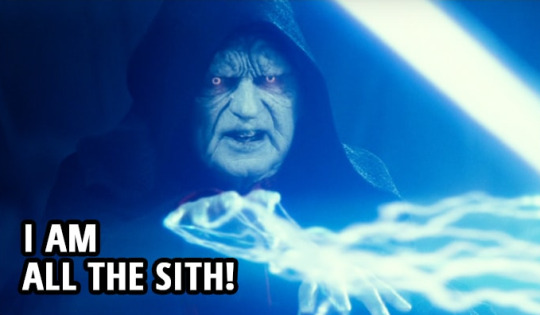
It ain’t J.J’s fault that he was actually looking at the bigger picture while critics were not.
Bonus: another video plug, because this guy is a Star Wars fan that truly deserves it.
6 notes
·
View notes
Text
Once again it is time for some 2011-2014 era Loki discourse because I have been confronted with.....um...a certain Hot Take, and I must respond publicly because I have been blocked from responding in DMs and I cannot just let this go because my brain is screaming. So here we go...uh...proceed at your own risk
cw for mentions of (fictional) g*nocide

First message: “For the record, Loki going insane actually does excuse him trying to destroy Jotunheim. It doesn’t JUSTIFY it, but it does EXCUSE it. Being unable to control/understand your actions excuses them, no matter how horrible they are. In the court of law, Loki would have been rehabilitated, not punished.”
Second message: “For the record, Loki going insane actually does excuse him trying to destroy Jotunheim. It doesn’t justify it, but it does excuse it (big difference). Being unable to control/understand your actions absolves you from blame, no matter how horrible they are or the consequences. Loki needed to be rehabilitated, not punished. Nothing can justify g*nocide. It is inherently wrong in and of itself. But he is excused by virtue of not having known any better at the time.”
For the record, I do not know this person who has messaged me and, as I say above the read more, I cannot respond to them privately both because they have restricted their message settings to only blogs they follow and also they seem to have blocked me after sending these messages.
let’s Get Into It, shall we!
Okay……so……….I might conditionally agree with you, if you were talking about Loki attacking Earth—when he does that, he is under the influence/control of Thanos and of the Mind Gem, and therefore he is not fully in control of his actions when he attacks New York, so I wouldn’t say he should be penalized as though he were.
What I’m getting from you saying there’s a “big difference” between an “excuse” and a ‘justification’ for someone’s actions is that there’s a difference between being able to point to a reason for someone’s actions versus saying that someone’s actions are correct. And yeah, of course there is. But also, again, just because there is a reason for someone’s actions, mental health related or otherwise, does not mean that the effect of their actions can/should be ignored, or that the person can be entirely absolved from blame unless they are under complete duress. If you’re referring to the difference between justification and excuse in law…..well if Loki were to be tried in a court of law on Earth for his crimes in Avengers, I guess he would have grounds for an automatism or duress defense because of the mind control, which would hopefully get him sent to a psych facility for rehabilitation instead of a straight up prison…but I don’t know how exactly the judicial system would factor in magic or how they could prove Thanos’ involvement when they didn’t know about him at the time and the only one who knew of him was Loki and he probably wouldn’t be considered a credible witness…and also he wasn’t tried on Earth and again I don’t know if they have psych facilities on Asgard and based on his hearing in Thor 2 I really don’t think their criminal law system is the same as it is on Earth. I certainly didn’t see a jury of his peers, just Odin being a dick.
But since you’re talking about Jotunheim, that’s a whole different situation/mental state he was in. Yes, his messed up emotional state is a reason for his actions, but I believe that he does know better, and even if he didn’t, “not knowing any better” Does Not erase the harm that someone’s actions cause (especially when they are as bad as g*nocide!). It may explain why the actions occurred, but the existence of an explanation really does not always justify complete absolution, and in Loki’s case with Jotunheim, I don’t think it does, because I don’t think there’s any evidence that he was ‘insane’ in a way that prevented him from understanding the gravity of or controlling his decisions, and the movie (through Thor) ultimately condemns the hateful ideology upon which his decision was based (that Frost Giants are monsters and deserve to die). I can call his behavior ‘insane’ or ‘unhinged’ or ‘mad’ (to borrow Thor’s term for it), but that doesn’t mean that I think he was truly mentally incapacitated. He’s a dramatic bitch and (in my interpretation) he had years of weird resentment and insecurities building up before Thor’s banishment and the adoption revelation happened to catalyze his wacky behavior in Thor 1.
In terms of real life human legal terms and systems (if those are even valid to apply here, which, for the record, I don’t think they are because this is a fantasy world with an entirely different and unknown legal system), I don’t think he falls under the requirements for an “excuse” defense. I don’t think he’s shown as ‘going insane’ to the point where he wasn’t able to control or understand his actions. There isn’t ever a moment in the movie like in Avengers when Thor is like “look around you. do you think this madness will end with your rule” and he looks genuinely startled and upset by his actions for a second—that moment in Avengers makes it clear to me that he’s being influenced/controlled, and also that he’s capable of recognizing the harm he causes when confronted with it. But in Thor 1, he stands by his choices until the end, and even after that, he doesn’t express remorse or a sense of newfound understanding that what he has done is wrong or was out of his control, even when he is told by Thor and Odin (and Frigga, in Thor 2) that what he has done is wrong. His anger is driving him, not ‘insanity.’ He knew the meaning of his choice to destroy Jotunheim with the Bifrost: it would “destroy that race of monsters” (his words) that he wants nothing to do with, and it would “prove to [Odin] that [he] is a worthy son.” When Thor says to him, “you can’t kill an entire race,” Loki responds, “why not?” and reminds Thor that he was ready to kill them all earlier, and that they have been taught their entire lives that they are monsters and not deserving of mercy or respect. He knows that it is g*nocide, and he chooses to do it because he sees it as the justifiable and correct solution to his own and to Asgard’s problems, and because it is a way to express his anger—here, he is working based on hateful ideology he was taught in conjunction with his own grief and anger. His feelings of betrayal and self-hatred and anger lead him to make this decision, not any demonstrable mental disorder; in desperately trying to retake control of his life and show to himself and to his family that he belongs and is “worthy,” he makes a choice, does not express remorse for it afterwards, and at no point is shown to be acting out of character/not in control of himself and his actions. Thus, he should be blamed and take responsibility for the damage he caused. A dramatic anger and grief response would not qualify as an excuse or justification for a crime, nor does it necessarily indicate mental illness…definitely not on Earth, and I highly doubt on Asgard (I don’t think that it would make sense to apply any diagnosis based on human psychological science to his mental state, seeing as he’s not human. Or Asgardian. I don’t know the state of psychological science on Jotunheim, but if you do know, feel free to enlighten me).
I can see and understand his reasoning/explanation/the “excuse” behind the action, but that doesn’t mean that I can (and the movie doesn’t) endorse it or say that it can be entirely “excused,” because as you say, “nothing can justify g*nocide.” Again, since he’s a fictional alien, I don’t think it’s relevant or productive to actually apply our labels or frameworks of thinking about mental illness to him. In the real human world, his emotional meltdown in Thor 1 might be grounds to say that he is mentally ill, but because he never expresses remorse for trying to destroy Jotunheim afterwards, that to me emphasizes that the choice was not entirely a result of his messed up mental/emotional state, but a combination of that and a logical (albeit morally terrible) line of thinking. The moment at the beginning of Thor 2 when he has his hearing about attacking Earth solidifies this interpretation even more to me, because he makes it clear that his actions (which in this case were influenced by Thanos/the Mind Gem) were a result of what he’s been told his entire life: “that [he] was born to be a king.” While he isn’t referring to his attempt to destroy Jotunheim there, it does indicate that he holds the belief on his own, even when not mind controlled, that atrocious actions can be excused because of his interpretation of his socialization. I agree that if he were not in control or didn’t fully grasp the meaning and magnitude of his actions that he could be ‘excused’ a bit, but I disagree that it would ‘absolve’ him entirely. It doesn’t change the fact that the realm was almost obliterated. Nothing he ever says/does/emotes communicates that he didn’t know or didn’t realize what he was doing when he tried to destroy Jotunheim, he is only upset over having failed (“I could have done it, Father. I could have done it. For you. For all of us” he says); he never expresses remorse for his attempt to destroy it, and this does not seem to be because he is prevented from seeing that what he did is morally wrong—again, instead, he seems to think that his morally reprehensible actions can be justified by his motivations. His judgement was determined by anger, but being emotionally driven doesn’t mean one is ‘insane.’ Again, I agree that he “needed to be rehabilitated,” because he is a very very unstable person who needs to learn how to process his feelings better, but we can also see throughout all of the movies that he has trouble accepting and admitting the consequences of his bad choices, even though he tends to know when his actions are bad (either because he just knows and is being a bastard and/or because Thor tells him). That’s one of his major personality flaws. His first instinct is usually to get defensive and angry and try to explain away his actions because of his trauma, rather than empathize and try to acknowledge and apologize for what he has done. He needs to understand that he can’t just make horrific choices and then “excuse” them afterwards, no matter how distressed or traumatized he was at the time—especially when the choice is g*nocide that he was not mind controlled into attempting. Therapy could absolutely do this for him, and probably would be most effective even without a formal diagnosis of anything, because it could help him understand how his personality affects and is responsible for a lot of bad behaviors. But a dickish and highly emotional personality does not equal ‘insanity.’
In summation: he’s not insane in Thor 1. He’s acting based on discernible emotionally and ideologically informed logic, even though that logic is morally reprehensible. Also I think it is dangerous to say that if he were insane something like g*nocide could be excused just because it can be explained by supposed insanity—it does not erase that it happened, and that it is terrible, and should be atoned for. Maybe in the real life human American legal system he could go for some sort of excuse defense, but I don’t think it would hold up in court. Just because he would very much benefit from therapy does not mean that he went ‘insane’ and that such ‘insanity’ drove him to attempt g*nocide; his distressed mental/emotional state does mean that he should receive rehabilitating treatment, but a need for rehabilitation does not mean that he is also not deserving of blame for the consequences of his actions, and for making the decision to commit an atrocity in the first place.
In conclusion: I love Loki very very much. I do not blame him for his space meth-fueled actions in Avengers (2012). I DO blame him for choosing to try to commit g*nocide when he could have chosen not to do so in Thor (2011). And yet I still love him, because I am capable of both loving a fictional character AND recognizing that he is a bit of a war criminal.
#loki#original post#i have these movies memorized please do not come at me as if that is not the case#before anyone asks no im not a lawyer but i do have a brain and critical thinking skills#PSA: please don't start discourse with people in DMs and then block them that's very weird and fucked up behavior#like. what the fuck bro. let me respond to you#marvel
8 notes
·
View notes
Text
The Good Place season one full review
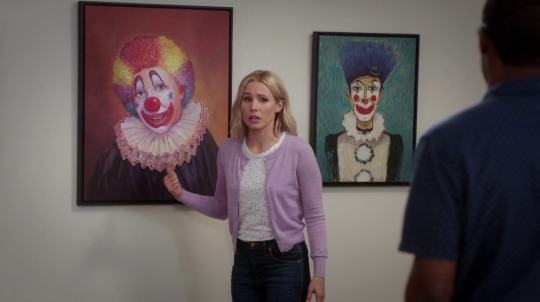
How many episodes pass the Bechdel test?
100% (thirteen of thirteen).
What is the average percentage per episode of female characters with names and lines?
49.58%
How many episodes have a cast that is at least 40% female?
Twelve of the thirteen; seven of those are 50%+, and two of those are over 60%
How many episodes have a cast that is less than 20% female?
Zero.
How many female characters (with names and lines) are there?
Twenty-four. Eight who appeared in more than one episode, four who appeared in at least half the episodes, and three who appeared in every episode.
How many male characters (with names and lines) are there?
Twenty-two. Eleven who appeared in more than one episode, three who appeared in at least half the episodes, and two who appeared in every episode.
Positive Content Status:
Solid; the nature of the show is such that they really need to be making a concerted effort to reflect positive, progressive morality, and as such faults in the content would also almost certainly be considered faults in the show itself (average rating of 3).
General Season Quality:
Magnificent! It’s a wonderful ride, whether it’s your first time through or not. Just delightful.
MORE INFO (and potential spoilers) under the cut:
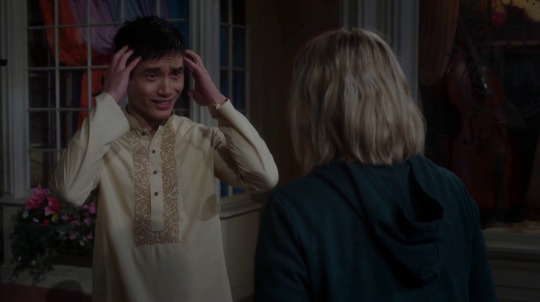
So, let’s talk about plot twists. In the current entertainment landscape, it seems like everyone is intent upon ‘subverting expectations’, and the good old-fashioned plot twist is very much swept up in that, since a subversion is almost always going to play as a ‘twist’ by definition. The unfortunate thing about this current landscape is that it’s rife with ‘subversive twists’ which are really just bad storytelling; they’re only there because of some pathological fear of predictability, or worse, because the creative minds just want to feel cleverer than their audiences by delivering content that no-one saw coming, serving their own egos at the expense of coherent narratives. If your ‘twist’ is about your own (supposed) intelligence, if you’re baiting the audience by playing into a common trope and then laughing at them for thinking you meant it, if you’re changing the story out of nowhere just for shock value without bothering to build toward the twist because you’re too afraid that someone might figure it out before the reveal...that’s not a real twist. It’s not even a real subversion, it’s just a bad-faith gimmick. It’s not there for the story at all, it’s there to make the writer feel special, because apparently feeling special for delivering quality storytelling isn’t good enough anymore. A proper, genuine plot twist should:
1. make sense in the context of the narrative (it should not be tonally dissonant or jump the tracks into a different genre)
2. make sense with the content of the narrative (it may recontextualise previous events or character choices, but it does not contradict or ignore them in order to function)
3. be foreshadowed (if it comes out of nowhere, that’s not a twist, it’s a random event. It’s a deus ex machina. There’s no story in it if it isn’t built into the fabric of the narrative)
4. ultimately further the storytelling (if it has no consequences for plot or character, it’s a shock-value gimmick, not a real twist).
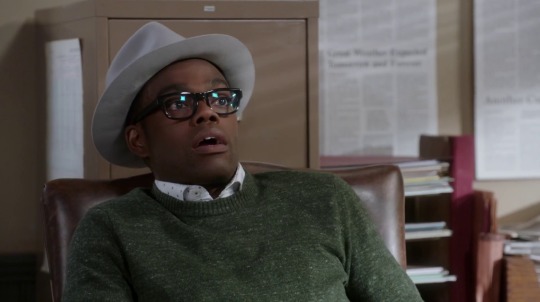
The above points do not guarantee that a twist will be good storytelling and not just a subversive contrivance for the fuck of it, but they should at least ensure some logical cohesion and protect the integrity of the plot instead of sacrificing it in the name of empty surprise. That covered, it’s easy to see how – even (or perhaps, especially) in this twist-saturated tv landscape we currently inhabit – the big twist for season one of The Good Place still manages to be – in technical parlance – dope. The writing protects the twist not by being ‘too clever’; it simply offers a decoy issue to drive the plot. Eleanor is a Good Place fraud; that’s the first twist in the plot, and it compels the entire season forward. Other twists - Jason’s reveal, Eleanor’s confession, the introduction of the ‘real’ Eleanor - set the stage for this being A Show That Has Twists, but in a way that makes so much contextual sense that it doesn’t set us up to be looking for the next one (a common problem for those shows that rely on ‘cleverer than the audience’ twists - they’ve set themselves up as mysteries for the audience to unravel, and then they kill their own storytelling as they twist in knots trying to keep ahead of millions of intelligent viewers). The Good Place actually tells us outright that something is wrong with this supposed ‘happy afterlife’, it just fools us into thinking that we already know what’s wrong, so that we don’t see the signs of the truth for what they are. Crucially, however, it doesn’t matter if you figure it out before Eleanor does. You can have your suspicions (or have had the show spoiled for you in advance), and you can still appreciate and enjoy it as it unfolds, you can pick up the clues and have a good time with them, and that’s something that all of those gimmicky-subversion plots out there are missing. Their ‘twists’ are not proper functioning pieces of the narrative, and so the story doesn’t work if you already know the reveal; there’s no juicy build-up to enjoy, or worse, you expose your own illogical contrivances or outright plot holes that were created in the course of writing a crappy twist just to feel relevant. The Good Place works because - like any good story - it isn’t about the twist. It’s about the journey.
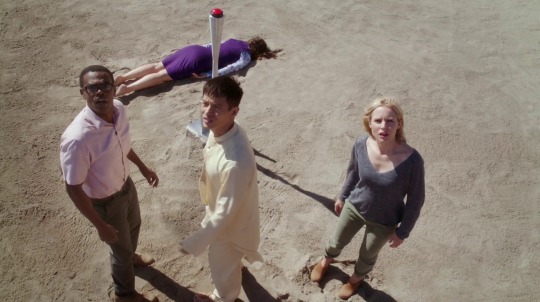
An important part of what makes the twist work also is that it interweaves the sins of Tahani and Chidi with the discissions of morality without drawing too much attention to them; if all four humans had simply been frauds, it would have been narratively empty, especially if the reveals were coming late in the piece. Jason’s works because it comes out early, and because the Jianyu cover is interesting and distinctly different both to Eleanor’s ploy and to the behaviour of the rest of the neighbourhood, but if the others had turned in the same way it would have been too contrived, too easy, and it would toss out the personalities we had gotten used to (which would violate Good Twist point #2). Since the show DOES pull that trick with Michael (which works because he’s the architect of the whole situation, not a pawn within it), it’s essential that they’re more subtle with Tahani and Chidi’s reasons for being where they are, and in playing it as they do they also reinforce the show’s central deliberations on morality. It’s an inspired framework for approaching what are traditionally considered ‘heady’ themes (and y’all know I’m into it), and every decision about how to approach and balance character behaviour is coming from a position of ethical consideration, weighing not only the acts themselves, but how they compare to the moral theory of various different and conflicting philosophies. It just goes to show that you don’t have to make something ponderous and inaccessible in order to have a cerebral conversation through television - you can do it just fine with afterlife comedy.

As I noted above the cut, the nature of the show automatically lends itself to careful consideration of any feminist and/or progressive content, and as such it should keep a pretty clean bill throughout, or risk cracking its own concept. I do wish they would come out stronger on the queer side of things (as I said in the episode posts, they really aren’t vague about the idea that Eleanor is attracted to women, but her saying words about hot women is still not delivering a lot on the representation front, especially when she is known to do more than say words when it comes to dudes, and the only other queer content we get is the fact that Gunnar and Antonio are soulmates, and that doesn’t technically mean they’re romantically or sexually involved (especially since they’re fakes anyway, but that’s a whole ‘nother thing)). In the mean time though, we have a female lead, 100% on the Bechdel and an essentially balanced number of male and female characters abounding, plus some really nice variety in racial backgrounds (and great names to go along with those - it’s a bit of a peeve of mine usually when show’s include multicultural characters but land everyone with Anglicised or ‘white-friendly’ names. Let the Bambadjans of the world keep their names). We’ve taken a clear stance on even ‘benign’ sexism (i.e. the stuff that’s just men saying inappropriate things - ‘just a suggestion! just a joke! just trying to get a reaction out of you, why are you so sensitive?’ - it’s all literal demon behaviour here), and I won’t pretend that I’m expecting them to get into the real nitty-gritty, but that’s ok. I’m happy to have something which is making a point of not being problematic, because such refuges have real value. So, maybe there won’t be a lot for me to tease apart as the show progresses, but that’s not a bad thing. At the moment, we have green lights across the board, and that’s a hard thing to find. I’m going with it, and we’ll see where we end up.

31 notes
·
View notes
Text
Why the Fullbringer Arc is an important plot milestone - 2
the continuation of this post and I’m bak on my bullshit~ remember my brain will jump to things
also CFYOW spoilers
so part 2/?
key figures and themes of the arc
So last time I said that ppl disliked the majority of new characters because, as opposing to the ones we grew familiar with, the arc was differently paced and so we didn’t have time at large to form some sort of solid connection to them.
And here the magic happens, because we do not have time to get attached to the characters and they seem to be faded against the background of all the others.
But apart from COMPARISON Fullbringers are quite an independent unit that focuses not on how much reiatsu you have, but on skill
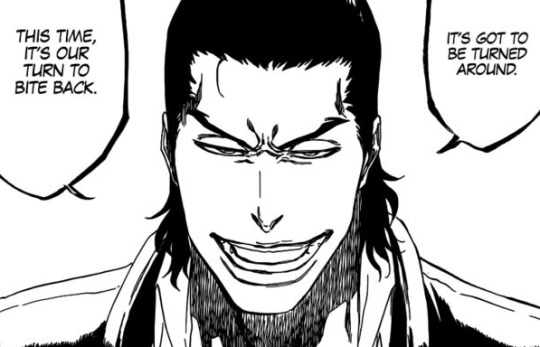
In the Can't fear your own world novel the origin of Fullbringer power is revealed and it’s shown how actually universally badass those powers are, take Tsukishima for example, who grows a tree in a second to ward off lightning, simply adding himself to the past. Atomic.
For living people even just getting close to the level of those with whom they fought (three captains and three leutenants) and not dying in the first moment (except u Giriko) is a great achievement. For people who are not Ichigo Kurosaki with a family tree rivaling GoT of course.
There is another important motive associated with fullbringers, which I mentioned above, and this is LONELINESS. And it's served so brilliantly that I'm going to die now.
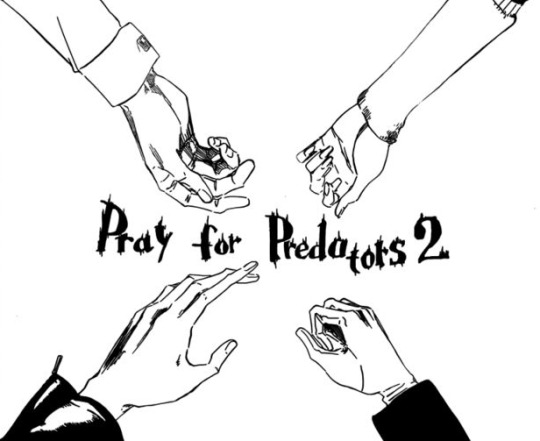
If you look and read carefully, it becomes clear that even the fullbringers gathered together are unusually, exasperately lonely. (See the cover? They reach out but never do truly connect) This is the curse of their power. This is their main weakness. This is their unusual humanity and kinship with the Hollows.
This is also why, but that’s my guess, their whole presentation is very lacking, to show how they fall out of everyday life and proper sozialising, so even we, as readers, cannot properly connect to them. Same reach out, but not hold symbolism. Or I am giving too much credit, we just don’t know?
Even the one who has assembled the whole group, Ginjo, is an even lonelier person who has terrible trust issues, who survived betrayal and persecution, and everything that he once believed in was set upside down. And even knowing what kind of person he is, fullbringers, driven by loneliness, followed him. (Though, we must admit, he weilds his words well and rolls +20 on persuation)

Because, although for a short time, he helped them to bear the burden of this loneliness.
Needless to say, the entire initial situation with OG fullbringers happened not only bc of some noble meddling, but also due to the fact that Ginjo gathered people to TAKE POWER FROM THEM SO THEY COULD LIVE A NORMAL LIFE
Ironically enough, each Fullbringer posesses a piece of SOUL KING, which is the source of their power and lures Hollows to pregnant mothers, which is such an important piece of information it makes me mad it was only explained in CFYOW.
Although it is understandable why Kubo chose not to focus on it during the arc. My take is he planned to show the importance of Fullbringers and their origins during TYBW, but we all know it didn’t happen.
Another common theme that follows from the previous two is PTSD, which unites the characters and key figures of the arc, and the paths of experiencing trauma constitute another conflict, where Ichigo overcomes it through friends and the return of strength and motivation, as opposed to Ginjo, who choses destuctive way to handle his own trauma.
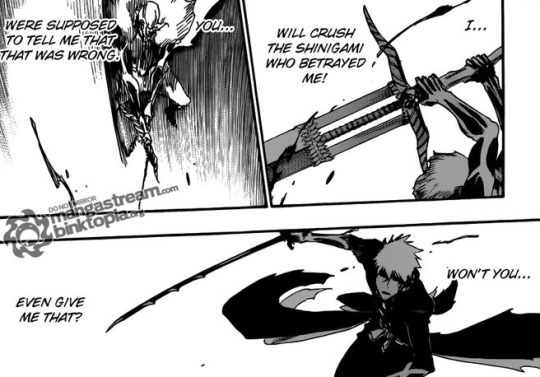
In short flashbacks shown during “Pray for Predators” chapters, we can also clearly see PSTD practically in every person’s past. Each of Fullbringers go about it differenly, most proactive being probably Riruka and most reactive being Tsukishima and Ginjo. Which is also symbolically shown that people, who can go own with their lives and finally integrate into society stay alive. Those, who cannot, go to SS and are set into new path by more drastic measures.
I will surely attribute to the pluses how Kubo shows Ichigo's PTSD, literally in 3-4 chapters showing how he cannot, like Remarque's hero, settle in peacetime, because he constantly catches triggers, for example with his substitute badge.

Through Ichigo’s thoughts is shown how he merged with his position as a substitute shinigami and constantly thinks in categories that are not very applicable to his normal life, which he seemed to have dreamed of for 16 years And now he actually got it, but absolutely does not know what to do with it.
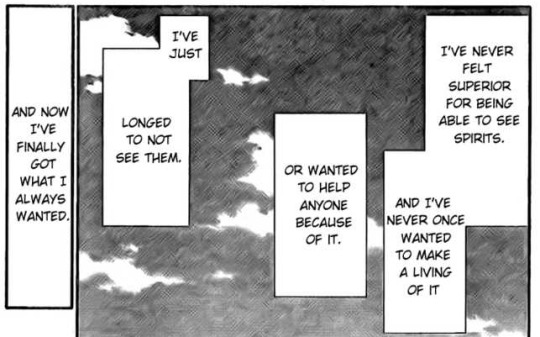
Kubo skillfully fuels PTSD and Ichigo's anxiety which is why he is being swayed by Ginjo's words correctly spoken at the right time.
Example: Karin speaks of his brother, they say he always fought to protect Ginjo fuels Ichigo’s doubt , saying he must act to protect his family
Accordingly, the theme approaches the climax for a push into the plot at the time of the attack on Ishida, Ichigo gets a punch in the gut twice: first from Ishida himself, who, with his unwillingness to tell things, pokes Ichigo into his helplessness and excludes him from the circle of trust, which IS the last blow
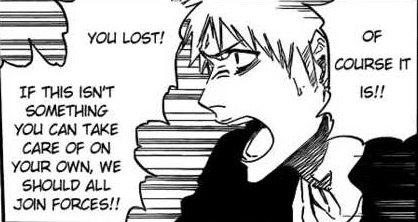
And then from Ishida's father, who by his behavior shows that Ichigo's efficiency now amounts to zero, so much so that he cannot even protect Orihime while she walks home, which is why he runs away in frustrated feelings, realizing the message. So this intro is absolutely veritable and ingenious.
And so that you understand how desperate Ichigo is, if not yet, then here is a panel where FATTEST visual forshadowing happens. And here is an absolutely genius moment to understand that Ichigo is not a child but a teenager with all that it implies
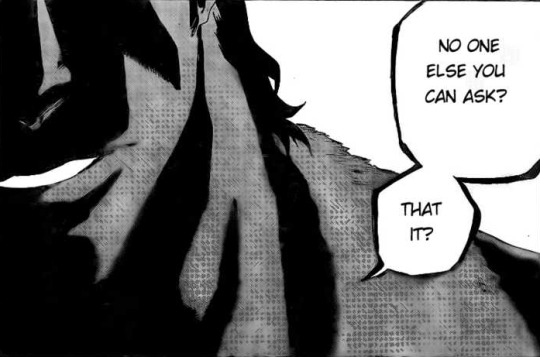
He may be battle-hardened, but this is a 17-year-old living boy with trust issues, and if we remember that through his manager's lips we are given a direct hint that Ichigo is still immature in a way, so the meaning of this arc as a stage of Ishigo's psychological maturation becomes clearer.
Just look at the face he has when Ginjo promises to return his powers (not to mention the hysterics after that) Is this a healthy person's face?

And here my hands are literally itching to start talking about Ginjo, because to give an antihero who, in addition, will have a much closer dynamics with Ichi than Urahara, plus for the duration of the arc will act as a mentor and father figure, this is just genius. Don’t @ me.
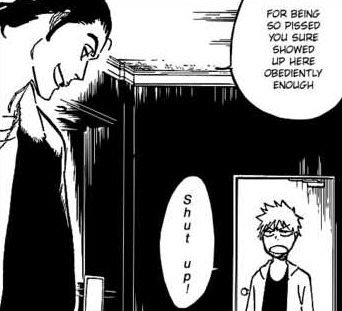
But the next plus, which will then bring us further, and this is THE Forshadowing
Everywhere, just everywhere, starting from the very first pages.

And Kubo still confuses us in the course of the narrative, but my god, when you re-read, Easter eggs are crammed almost in every chapter and I think its beautiful. Both verbal (Ginjo is such a bad actor that he has to change his memory badumts) and visual

The plus that I mentioned earlier is 100% more lively dynamics between Ginjo and Ichi, because both are people and in fact, there is much more than it may seem at first, that brings both together. And the friendly connection that they establish with each other in this arc still not 100% false placeholder. (Which is easily spotted by the way Ginjo adresses Ichigo through the arc especially last chapters).
And at the same time, they are in many ways the antonyms of each other, in age, color scheme, design, even names and also in what gives them motivation, in how they react to this or that event. For example, Ichigo is quite an emotional guy and puts his soul into everything, so to speak, then Ginjo, for example


Plus, the latter is not only skillful manipulator, but also embittered. And through such contrast, with generally the same input data, Kubo shows us that there is always a different path, leading to the topic choice, and where each specific one can lead a character.
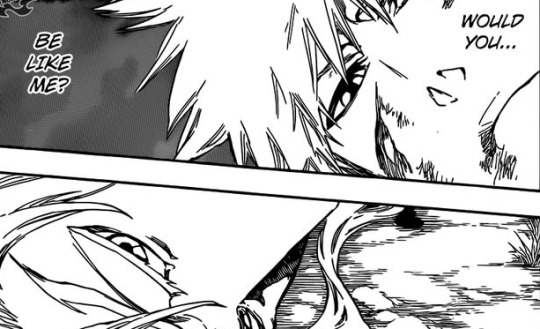

Which absolutely doesn’t stop Ichigo from familirizing himself right off the bat and the two of them have comedy gold moments from the start. It is more lively, than being set against 300+ y.o. Urahara (whom I love as a character).

And, cross my heart Isshin is a great character, but he’s got that father of the year award, and Urahara can only give like a little itsy bitsy of information at a time only if it benefits him or a bigger picture, so the mentor’s role goes to Ginjo, which is well earned as he is technically the First Substitute.
Ginjo is a mentor, a guide, and the main antagonist of the arc, which in itself is an unexpected and interesting combination within the framework of Bleach. Here is a living example, in the moment of training he can go so far as to help Ichigo overcome his psychological barrier by simply and cruelly breaking him.
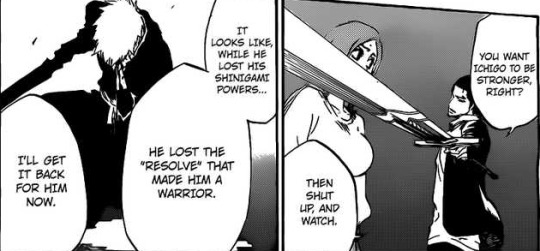
Which he does in the most painful way, through the trauma and inability of Ichigo to protect his loved ones. And from the reaction of the latter, childish and naive, his immaturity can be clearly seen (see the previous points). Although we do not know this yet, Ginjo is constantly trying to teach Ichigo one lesson that he himself learned the hard way.

Combining this with such an important praise for a teenager and faith in Ighigo’s powers, which Ichigo was deprived of for 17 months as soon as he lost his powers as a shinigami ( all relatives are trying to isolate him from this, no one believes that he can and is able to stand up for him). This is another plus of the arc, namely the whole depth of the betrayal that Ichigo experiences when the cards are revealed.
Maybe the quincy arc would go completely differently, if Ichigo felt Ishida's betrayal or reacted to the truth about his mother in a different way. Did Ginjo not temper/prepare Ichigo in the way he did, did he involuntary not strengthen Ichi internally... Who knows how Bleach would end in general.
This is to the question of the importance of this arc yes
P.S Strengthening the body also benefited Ichigo.Friendly reminder that he fights in his physical body for the entire arc except the end.

And the training episode immediately appears in a different light, right?
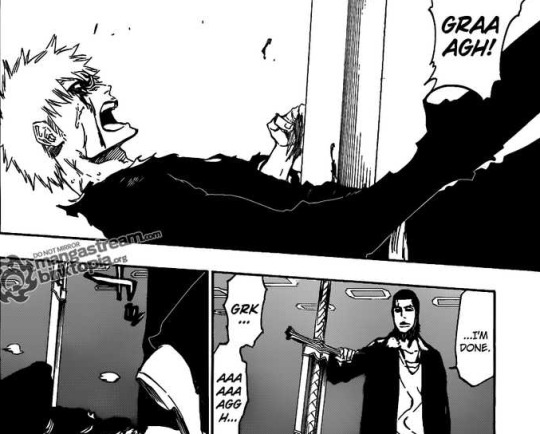
And in my next hot take I will focus on another really important thing which is salvation and my own bitterness of why didn’t Kubo explore the whole SS thing and now we have to fee ourselves
#bleach#bleach meta#ginjo kugo#ichigo kurosaki#fullbringers#my fingers are tired#omg i can't shut up#look at all the potential we could have#look at ginjo#this is for free
15 notes
·
View notes
Note
what do you think about the new handbook?
In January 2016 I received a calling that gave me access to the Church’s Handbooks and I was surprised at the amount of specific things in there on which I had never considered the Church having an official position. I imagine a lot of people are having that experience this week.
I’m glad the Church made the Handbook available to everyone, it’s a move towards transparency. Before this, people were being held to standards or facing processes that only their leaders could access.
I appreciate that in some areas there’s better framework and clarity, but am sad that it often came in the form of being more restrictive or not in line with modern science.
I’m going to outline the changes and add a few comments. ’ll put my opinion about all of this at the end, so if that’s what you want to see, scroll to the bottom.
—————————————————————
Miscellaneous
The Handbook covers a lot of information, so I’m certain in the days and weeks ahead more new things will be discovered. But for now, here’s some assorted policies.
Sacrament
We’re supposed to take the Sacrament with our right hands
The wording that young men are encouraged, but not required, to wear a white shirt and tie is gone. All males who pass the Sacrament are asked to be clean and well groomed.
For a long time, which hand to use has been considered a personal choice, and some associated special meaning by using their right hand.
In February 2019, Elder Oaks saw some youth take the Sacrament with the left hand and he gave a short lecture that went viral telling these kids they were wrong, and now it’s official policy in the Handbook.
Dress Standards
The Relief Society Presidency is to teach dress standards to the sisters so their appearance and clothing show reverence and respect at Church and at the temple.
These are adult women!!! They can’t figure this out for themselves? It mentions ostentatious jewelry and casual clothes without any examples of what this means. I’m afraid some leaders will enforce their personal opinions, such as pants are verboten.
Also this section included a comment about ostentatious jewelry. What is that? Having 2 earrings in 1 ear?
—————————————————————
Discipline
Disciplinary councils have been renamed “Membership Councils”
People no longer are disfellowshipped or excommunicated. They have “formal membership restrictions” or “withdrawal of membership”
Does away with the unequal disciplinary structure for adult men vs adult women.
Before, men who were endowed had a disciplinary council at the stake level. Everyone else had a disciplinary council held by their bishopric.
Now anyone who is endowed and likely to have their Church membership withdrawn will have a stake membership council. Everyone else has a ward membership council for serious sins & actions
At the ward level, membership councils still function the same (the bishopric holds a council with the person whose membership is at risk).
At the stake level, the council now is similar to the way it works at the ward level (the stake presidency meets, without the high council also being involved).
The individual’s bishops can sit in on the council. The individual can also choose for the Elders Quorum or Relief Society President to sit in on the council.
Same-sex marriage is no longer apostasy
Apostasy has been removed from a list of reasons to hold a membership council. Instead it is on a case-by-case basis.
The stake president can place informal membership restrictions on the person and the stake president counsels with the Area Presidency (which are Seventy) about anything more than that, such as a membership council
The language is softer but the results are the same.
I like that men & women are treated equally in this new system. It always struck me wrong that most men in the church automatically had a council of 15 men and women had 3 men.
The reversal of the 2015 Policy of Exclusion finally made it to the Handbook.
—————————————————————
Gay, Lesbian, Bi, Same-Sex Attracted
Families & members should be sensitive, love and respectful of people who are gay, lesbian & bi
Sexual activity with someone of the same gender is on the same level as an unmarried sex.
Membership councils are optional in these cases, based on the leader’s discretion.
As long as an LGBTQ member is “striving” to live the law of chastity, they’re allowed to hold a calling and temple recommend
“Sexual cohabitation” used to be forbidden, now it’s “cohabitation”. So I guess gay people living together is a problem regardless of whether they have sex. I do know of a few couples who live together, but have given up sex in order to be temple worthy. I guess that’s no longer an option.
The mormonandgay website was done away with and some of the items moved to a new page titled “Same-Sex Attraction.”
Most of the links on this new page don’t work. I’m sure this will get fixed
Most of the “resources” from the old page aren’t on the new page.
The last 4 video stories of members from the former site are on the new site.
Credit for finally making this page available in languages other than English.
I wonder if it will still say it’s okay to identify using the terms gay, bi or lesbian.I know President Oaks prefers the phrase “same-sex attraction” and a lot of his influence is seen in the new Handbook changes.
The best section of the previous site was a collection of 17 members who are gay, bi and lesbian (well, 2 of them are parents of gay kids). Hearing them tell their story in their own words was powerful. Most of them have asked for their video to be removed.
The only stories remaining are 2 people in a mixed-orientation marriage and 2 parents who have a gay son. Each of those 4 members now has multiple videos (Laurie, Laurie’s husband, Laurie’s bishop, Laurie’s friend).
The experience of most LGB people in the Church is now absent from this page, which again confirms for me that this has been a site for leaders & family, not actual members who are bisexual, lesbian or gay.
—————————————————————
Transgender
Preferred names can be noted in your membership record and Church leaders are encouraged to use them.
People can also to ask others to use their chosen pronouns
Elective surgical or medical intervention (which I believe means hormone treatment) for the purpose of transitioning, and social transitioning will result in membership restrictions.
These restrictions include not getting to exercise the priesthood, receiving or using a temple recommend, and receiving some Church callings
Even if the hormone therapy is prescribed by a medical professional to ease gender dysphoria or reduce suicidal thoughts, membership restrictions will result
Transgender people who don’t transition can have Church callings & temple recommends
Gender is defined as “biological sex at birth.”
This is recorded on Church records and determines whether someone can receive the priesthood and how they experience the temple ordinances
Transgender people & their family are welcome to attend Sunday church meetings and social events
There is now a page for transgender people, just as there has been for LGB people
This whole section of the Handbook makes me sad because it reduces these members to being a mistake and they need to choose a side. Nevermind they were born this way and have complex lives, they need to look and act like a cishet member.
I’d love if the church leaders could show scriptural backing & the words of the Savior to justify their views on trans folks other than the Family Proclamation.
Credit to the Church for switching from “transsexual” to “transgender
While trans people are welcome to attend the 2nd hour of church, no guidance was given about if they can choose either Relief Society or Elders Quorum
It’s problematic to define gender being as your biological sex at birth. If gender is eternal, why is “at birth” needed? A doctor or nurse assigns a biological sex at birth by taking a look at the newborn’s external genitals. This is only 1 of 5 markers of gender. A doctor or a nurse is not God.
5 components of biological sex
external genitalia
inner reproductive anatomy
sex hormones
chromosomes
gonad differentiation (gonad secretions cause sex-specific patterns in many other tissues & the brain)
This section of the Handbook still speaks of gender as binary–you’re either male or female and trans. Genderfluid, nonbinary, or any acknowledgement of a spectrum doesn’t exist.
To say a trans person will face consequences for social transitioning is really troubling. What does “social transitioning” mean? Do pronouns count as “social transitioning?” Long or short hair? If people must dress according to gender stereotypes, then it seems like leadership is more concerned about the feelings of the 99 and not the health & well being of the 1.
Why is it only transgender members who have a ban on these surgeries? Lots of breast enhancements, reductions and mastectomies take place every month with not a whiff of interest by church leaders, but if it’s done to affirm one’s gender identity, then it’s forbidden, even if it’s life saving.
It did make me feel queasy to read that even if medical or surgical intervention is prescribed by medical professionals to deal with gender dysphoria or suicidal thoughts, too bad, we’re still going to punish you. What kind of monsters came up with this?
—————————————————————
Intersex, aka People Whose Sex isn’t Clear at Birth
The Handbook says the incident rate of intersex is extremely rare
Questions about membership records, priesthood ordination and temple ordinances for youth or adults who were born with sexual ambiguity should be directed to the Office of the First Presidency.
This is the first I’ve seen Intersex given their own section in the Handbook.
While policies about LGBT people are listed as “moral issues”, the section on intersex people is under “medical and health policies.” That’s a good sign, it means that the medical profession determines what is best, not a church leader.
I appreciate that church takes this out of the hands of local leadership. It’s a complex issue that untrained people shouldn’t get to have say over.
The Church assumes that surgical & medical intervention is needed for this group of people. Unfortunately it implies the default is to do so in infancy or early childhood when current best practices would be delaying, if possible, until the individual can weigh in on their body & identity.
The idea that intersex is rare, well that depends on what they consider rare.
The rate could be as high as 2% of the population or as low as 1 in 2000.
If we think of that in terms of Church congregations, it suddenly seems not so rare.
In North America, a ward must have 300 members. If 1%-2% are intersex, that’s a couple people in each congregation.
If we go with the lowest rate of 1 in 2000, consider that in the US & Canada a stake requires a minimum of 3000 members. So 1 or 2 members per stake would be intersex.
—————————————————————
I think these changes show that the Church is willing to include queer people up to a point. We can feel & be the person we believe ourselves to be as long as we don’t actually act in a way that affirms who we are.
We are to be loved, respected and welcomed, however these homophobic and transphobic policies remain in place. Love & respect is more than smiling & being nice to someone.
The policies of the Church regarding queer people is out of line with science. As science continues to advance and confirm that gender identities and sexual orientations are real and biological and not changeable by will, the tension for the Church on these topics will continue to grow.
“The only clear line I draw these days is this: when my religion tries to come between me and my neighbor, I will choose my neighbor. Jesus never commanded me to love my religion.” -Rev. Barbara Brown Taylor
Considering Jesus admonishes us again and again to love each other and that we are all alike to God, I can only guess that Jesus wept. Again.
108 notes
·
View notes